|
ThaumPenguin posted:Another great update, your writing skills is what really makes this LP Thanks, I appreciate it. Rincewind posted:I love all of the hints and allusions to things that happen in the future in these updates. I just had to trash half an update because it contradicted something I wrote before and I didn't realize it. It's kind of a pain but I enjoy it because the idea of a comprehensive and optimistic end doesn't appeal to me as much as an impression that a reader can view whichever way they want. I know the updates have been slow but it's really because I don't want to feel like I'm phoning anything in. blood simple posted:what's going on in the rest of africa? Nothing, basically. The awful Mittelafrika endures, the Amero-Liberian government was couped and replaced by an indigenous one, South Africa continues to be the historical South Africa we know and hate basically, except that they're neutral. Libya and Egypt are part of the Arab bloc and Ethiopia is still ruled by Haile Selassie and is pro-German as far as I can tell.
|
|
|
|

|
| # ? Apr 19, 2024 12:25 |
|
Has anything interesting happened with Totalist Canada? Do they get any event chains or anything?
|
|
|
|
Kellsterik posted:Has anything interesting happened with Totalist Canada? Do they get any event chains or anything? I don't think there's anything there other than the initial CTUC chain to set their policy.
|
|
|
|
Chapter Four: The Saharan Expedition (August-November 1941) de Volkstrant, August 12, 1941 The American Chamber Reconvenes Monday All You Need To Know Elections and votes always have significance across borders, but typically not as much as the votes currently being held in union halls across the Combined Syndicates of America. The votes were called for by General Secretary Carlo Tresca after weeks of paralysis in the Continental Chamber of Deputies over a proposal regarding the future of the American Red Army. With the threat of renewed world war consistently on the horizon, Chairman Benjamin Gitlow has pushed hard to extend the mandate for a professionalized American Red Army indefinitely and also to allow the force to operate without geographic restriction. The issue is divisive and many deputies are unwilling to cast votes without a clear consensus from their constituents. When the vote results come through, the Chamber will return from recess and the bill will finally be passed or rejected. 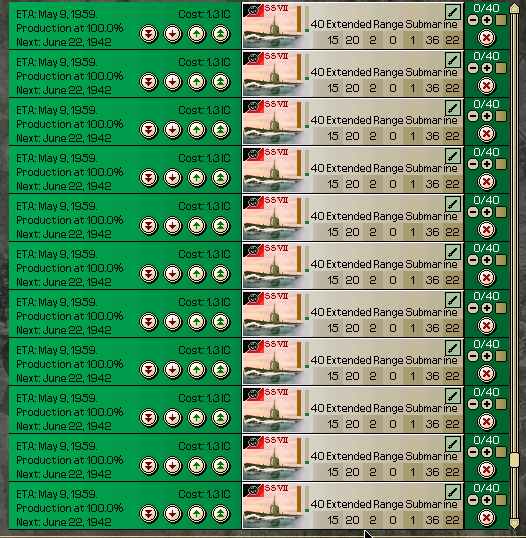 18 runs here The question specifically concerns the structure of the ground and air armies of the Combined Syndicates, collectively known as the American Red Army. None of the proposals involve the navy, which was granted a permanent and broad mandate upon its creation. The American Red Army is the successor to the Syndicate Guards, the group of ad hoc militias raised in late 1936 to fight in the civil war. The units were representative of particular unions and syndicates and fought against the United States Army and the American Union State while under an unorthodox command structure similar to the one used by the fighting units of the CNT-FAI in the recent Spanish troubles. 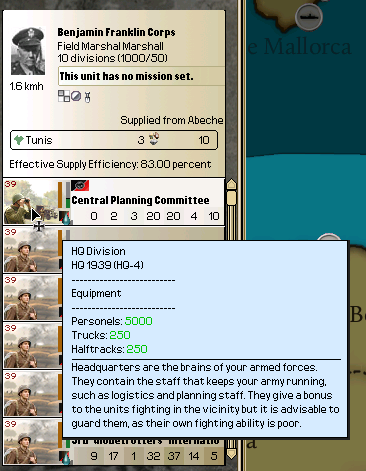 Supreme Commander George Marshall is widely regarded as the architect of the professional American Red Army that has gradually replaced the Syndicate Guards since the civil war. General Marshall is a common target for criticism from those opposed to the proposals. Marshall was the most prominent of a small group of United States military officers who defected from the MacArthur junta to offer their services to the Reed regime in 1936. Most of the Syndicate Guards leadership at the time was directly elected by their troops, many having no military experience whatsoever. After the war, Marshall was chosen by the late Chairman John 'Jack' Reed as the Supreme Commander, over distinguished elected leaders like Harry Haywood. Marshall instituted standards and structure that Gitlow credits with the swift and decisive victory in the North American war. Gitlow endorses the General as 'a duty-driven man without a political ambition in his body' but he is nonetheless regarded as a dangerous remnant of the capitalist United States by many, particularly due to his role in engineering the 1937 amnesty for most of the United States Army. After the surrender of Canada and the advent of total American dominance in North America, the role of Marshall's Red Army has become less defined, leading to calls for it to be dismantled or reduced in size. The labor movement in the Combined Syndicates has, according to University of Chicago history professor Dr. James Foster, a deep-seated mistrust of standing armies, as the pre-revolution army was often used to break strikes. Indeed, it was the Army, under the command of Douglas MacArthur, that couped the last President Hoover and set in motion the severe repression of labor unions that led to the civil war. Therefore, the direct control of military units by unions and syndicates is a jealously guarded principle, and an initial proposal to professionalize the entire military resulted in a comprehensive and embarrassing rejection by the Chamber. Gitlow quickly regrouped and proposed the 'two-structure' concept that is essentially the proposal being voted on this week. Within the Combined Syndicates, any military unit would operate much like any other union or syndicate, meant to act as a safeguard against the central government attempting to overrule workers' democracy using force of arms. Outside the Combined Syndicates, military units would operate with a limited democracy, retaining the ability to remove abusive officers but expected to follow orders otherwise and subscribe to standards proscribed by the top brass. The compromise was presented as a contingency plan in case of general European war and seemed to be headed for passage in the Chamber. A Referendum on Algeria? That was until the shocking events of this past April, when American military forces invaded Algeria. This drew an immediate and vehement response from opposition factions within the Chamber, who claimed that the invasion was outside the previously granted mandate. The Gitlow camp responded by claiming that it was within the mandate because the Algiers regime had declared war on the Combined Syndicates and that, as a direct threat to the security of France and southern Italy, they were an indirect threat to North America. In a traditionally isolationist nation wary of 'entangling alliances', the question of professionalization seems to have become a proxy for the broader issue of if the Combined Syndicates should step into its role as potentially one of the greatest powers in the world. With the Chamber unable to reach any kind of agreement on the proposal, it eventually agreed to go into a week-long recess and send the issue back all the way back down to the workers themselves. This is an unprecedented move in the Combined Syndicates and one that has been welcomed by the population. "I'm glad that this is still a democracy." remarked one Detroit autoworker, who says he does not trust the motives of the French and plans to vote No. "If we're going to win, we need to be united, I think. This will go a long way towards that end." said his co-worker, who plans to vote Yes.  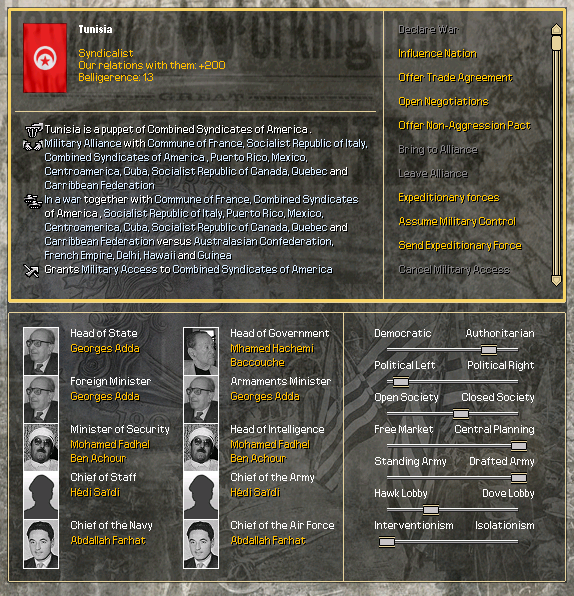 "I did not lay down my life during the revolution to see America become a different flavor of imperialist nation." protested another, who clearly plans to vote No. 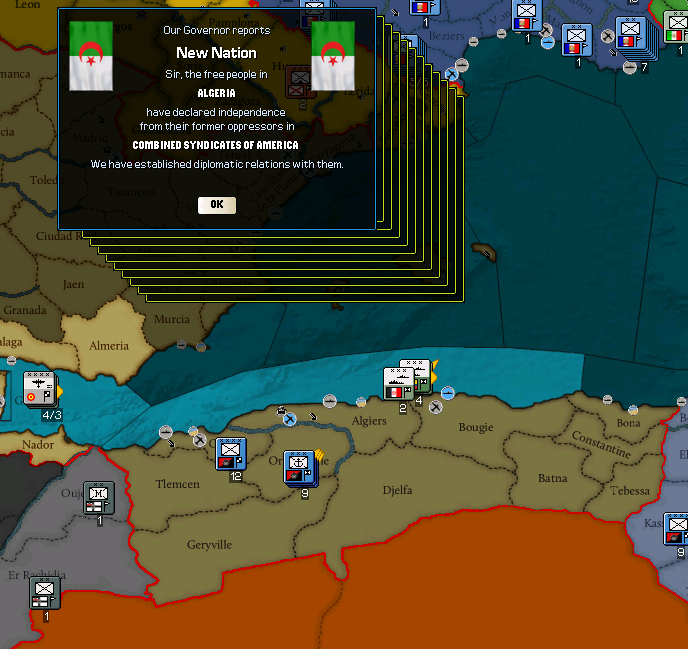  The Gitlow administration has attempted to counter such charges of imperialism by giving frequent speeches regarding the progress of Arab home rule, including one this week announcing the handover of many domestic functions in Algeria and Tunisia from the American Red Army to the socialist Arab resistance group, the Front de Libération National (FLN). This move was dismissed in one Chicago anarchist newspaper as merely symbolic, as the American Red Army retains control of abandoned French military posts and airfields. Whether those posts are meant to be used as a staging ground in case of European war or as a base from which to control the Algerian population is another matter of debate. South of the Sahara? The immediate consequence of the vote will be that it determines if the American Red Army extends operations to all of French West Africa, another issue that divides the nation. A large number of black deputies across faction lines have announced their support for such a move, drawing parallels between the white domination of black Americans in the American South with the white French dominion over black Africans in West Africa. This faction has gained a great deal of moral authority with the passage of a resolution by the mostly multiracial Caribbean Trade Union Congress endorsing American military action aimed at 'freeing the black man worldwide.' A competing resolution in the American Chamber was proposed that would instead encourage the provision of arms to local resistance groups, in the hopes that they will be able to topple the weakened Imperial regime on their own, and then provide economic assistance afterwards, a proposal that General Secretary Carlo Tresca derided as 'lending the neighbors a bucket to save their home when you're the fire chief.' How does this affect us? The current guiding force in American foreign policy is the so-called Reed Doctrine, which proclaims that the Western Hemisphere must be free of capitalist influence in order to safeguard the American revolution. As of now, the only 'capitalist' territories remaining outside South America are the isolated nation of Haiti and the possessions of the Netherlands. 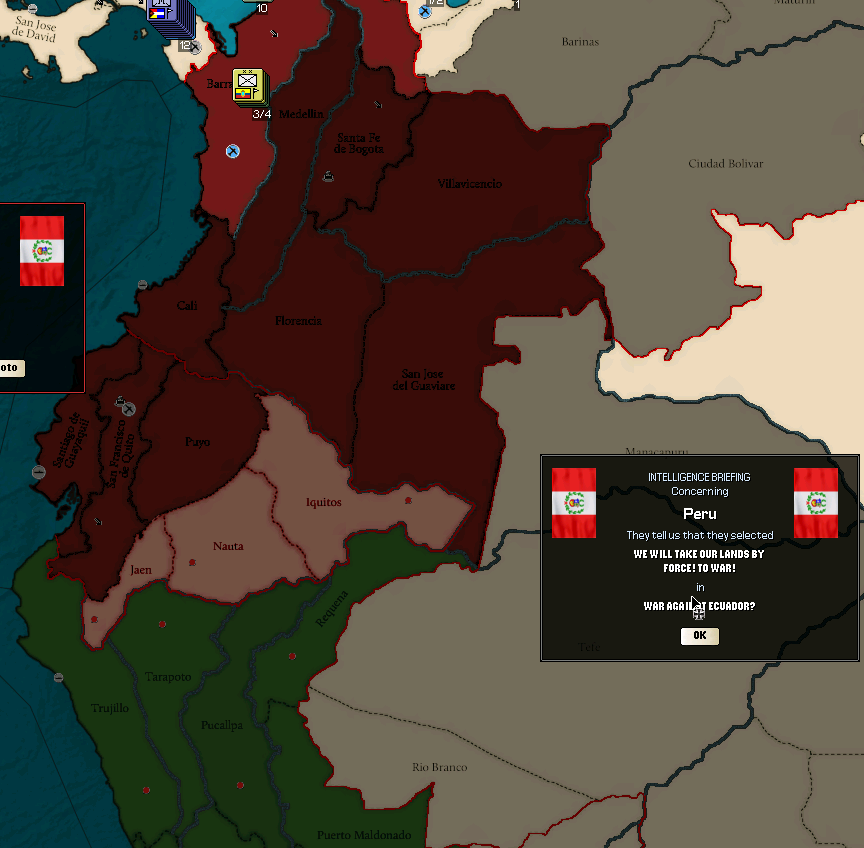 The debate has expanded from the West African question to theoretical situations across the world. Of particular interest is the situation unfolding in South America, a region traditionally part of the American sphere of influence. Debates have been held across the nation in which the possibility of intervention against either Colombia or Venezuela would be justified if either nation attempted to seize the Netherlands Antilles. Foreign Minister Floyd Olson caused an uproar when he said he did believe it would be justified so long as the SPAD remained both in power and on friendly terms with the Internationale, to which the party sends observers, even though the nation itself is regarded by the body as non-socialist. The benefits of not pushing the Netherlands into alliance with Germany, he said, were well worth 'dealing with the reformist agenda of their ruling social democrats.' This type of realpolitik is anathema to many of the most radical elements in the Chamber, where resolutions denouncing colonialism of any kind are commonplace. If any such operation were to take place, it is likely that it would need to be a professional unit acting on orders, as it is difficult to imagine a militia in the Syndicate Guards mold agreeing to help preserve the position of Royal Dutch Shell for instance. Were the proposal to go through, it would theoretically give the government the ability to authorize such an action, and soldiers could be at risk of dereliction charges if they refused. To a nation that revolted once against colonial masters and again against capitalism, such a concept may be a difficult pill to swallow. 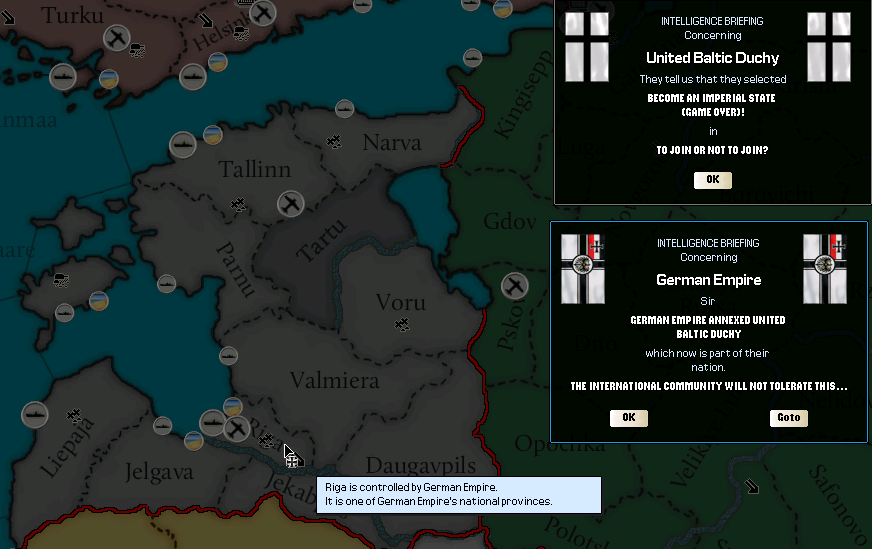 The Reactions "Our relationship with the Combined Syndicates is perfectly friendly, and I see no reason to expect that this issue should affect the security of either our overseas possessions or the homeland." - Prime Minister Albarda, in the Hague "America is supremely arrogant to proclaim a Reed doctrine about their hemisphere while continually inserting themselves into European affairs with their reckless aggressions in Africa." - the Kaiser, speaking during a Riga ceremony officially annexing the Baltic territories to the Empire "The fact that the Kaiser regards Africa as a European affair is precisely why we must be willing to use force to topple imperialist regimes." - Abraham Lincoln Corps Commander Harry Haywood "It is hard for me to imagine how, should this proposal fail, we would be able to effectively respond to a German invasion of France within a year, a year that France may not have." - Supreme Commander George Marshall "They say that we must relinquish our fought-for freedoms in order to protect France and the revolution. I say without those freedoms, there is no revolution to protect in the first place." - United Auto Workers president Wyndham Mortimer, at a Detroit anti-professionalization rally The deadline for union resolutions is midnight on Sunday, Chicago time. American nationals in the Netherlands who are eligible to vote in union elections are instructed to seek out the American embassy in the Hague in order to cast their vote. The Chamber vote is expected to take place on Monday or Tuesday. _______________________________________________________________  I don't know where that kid got an issue of de Volkstrant in the middle of the desert, but I hated him for it. Him and his yappy buddy wouldn't shut up about it. "Where the gently caress did you get a Dutch newspaper?" "What's it to you?"  "And where the gently caress did you learn to read Dutch?" "My grandmother was Dutch."  "You're full of poo poo. I think you're just trying to look smart by pretending to read it." This went on for hours. That loving Dutch newspaper was the most exciting thing to happen in the Karl Marx Corps all week. I had nearly died in Tennessee, Texas, Toronto and Tunisia and earned myself a position as the right-hand man to a distinguished general. All so that I could sit in a tent in the middle of the desert for a month and listen to the babbling of bored idiots all day long. Finally I stuck my head outside of my tent, which felt like sticking my head into an oven, and told the two of them to either shut up or go clean sand out of the tire treads until the sun went down. They chose wisely, and I was able to get back to my work with some quiet, if not comfort. Somebody in the First Great War described war as 'long periods of boredom punctuated by moments of sheer terror.' I dealt with a lot of boredom and a fair amount of terror, but nothing was worse than the soul-crushing boredom that was the Saharan Expedition.  The enemy had been smashed to bits, and while most of the American Red Army was waiting near the Mediterranean for their next orders, we, the dumb bastards in the Karl Marx Corps, were tasked with the least pleasant task of all: Get to Tamanrasset, figure out if its feasible to send an army across the biggest goddamn desert in the world, so that the Navy wouldn't have to get blown to poo poo trying to land the Marines in Dakar. In North America, we all thought we were the luckiest guys in the army because we had trucks driving us around. Now we were paying for the privilege while our pedestrian comrades relaxed in relatively mild weather by the sea. Oliver was the one who had volunteered the corps for this ridiculous mission, in all of his enthusiasm to get down to black Africa and put an end to the French Empire for good. We had fought together for years before, and would fight for years after, and Law had almost gotten us all killed a few times. I consider Oliver Law one of my best friends. This was the only time I ever seriously considered shooting him dead and taking over the corps myself. It wasn't entirely his fault but the only superiors I could honestly blame were practically on another planet, whether it be Algiers or Chicago. It was a miserable task no matter which way our luck shaked out, but it was made so much worse when the orders came down not to advance until further notice. The goddamn Chamber didn't think we were authorized to go any further south. So we sat in that lovely little desert town for the month of August while they argued about it in Chicago.  In the meantime, Oliver took it upon himself to act as ambassador to the Tuaregs. It was abundantly clear within the first week of our trip into the desert that the Tuaregs would either help us make it through the desert or make sure we didn't make it at all. The Tuaregs were obviously no fans of the French. They had revolted a few years before, but the French were able to put them down that time. Now, they were obviously in a much better position, thanks to our convenient destruction of their mortal enemy. The one benefit of being forgotten in the Sahara is just that, we were forgotten about. While the Chicago brass were constantly on Marshall's rear end about the state of things up north, nobody paid the slightest bit of attention to what Oliver was doing with the Tuaregs, so long as we didn't make an 'unauthorized advance'. We gave sporadic updates about where we had found the enemy operating, half of them bullshit, and they left us alone except to send a plane with ballots for the stupid Chamber vote. None of us were particularly taken with Tuareg society, particularly not the slave bits. But we would have more luck trying to kick the sun out of the Sahara than going to war with the Tuaregs. We could either get their help and look past their decidedly non-leftist behaviors, or we could protest and die in the loving desert. Principles are some of the first things to melt underneath the Saharan sun.  The northern Tuareg clans were willing to assist us, thankfully, but their assistance came at a price. They had no idea that Oliver Law had absolutely no legal authority to negotiate on behalf of the Combined Syndicates or the Internationale. Through our torturous translation process, we learned that the French would usually just send an army with a list of demands, so it was pretty easy for us to act the same part, though our demands were more requests and Oliver Law not being white probably helped us seem less like the people who had been killing them on a semi-regular basis for decades. The Tuaregs' conditions for assisting us were pretty simple. We would have to leave them alone, forever, completely. Maps were drawn up of the areas that the Tuaregs wanted complete sovereignty over. We made our own copy, but instead of labeling it as related to our illicit treaty, we instead labeled it as a warning. Don't go here or the clans will gently caress you up. And with how drat hot it was in this desert, I don't think anybody had to be told twice.  The Tuaregs were represented during our dealings by two people mainly. One older man with a huge beard and turban and a woman wrapped up in a headscarf, both looking like they had seen everything this desert had to offer. They were only representing a confederation of the northern Tuareg clans, but they pledged to use their influence among the other clans to secure our safe passage all the way south. Throughout our stay in Tamanrasset, we would speak with these two often to update them on what we were up to, and as we described what was feeling like an inevitable clash with Germany, they also said that the southern clans would be more than willing to help get rid of the German colonial troops who were intruding into Tuareg lands. And thus was born a bizarre and unholy entente between us and the Tuareg that would last throughout the war. We justified working with them as a matter of necessity (true) and as a prelude to "revolution through osmosis", in which we would bring socialist freedom to the Sahara just by having socialist states all around it (bullshit). I don't remember exactly what happened with that treaty we put together, but the hands-off bit was basically honored from then on.  Finally the stupid Chamber worked out which one was their rear end and which was their elbow, and our muzzles were taken off. It was time to leave our little oasis town. I had almost grown to like it. Almost. On our way southwest, we saw our bombers flying in the distance for what felt like the first time in eons. Powered flight was a welcome reminder of the twentieth century.  We even got some assistance in the form of another motorized infantry corps from up north. The two of us would handle the rest of French West Africa ourselves. That was basically the plan, a blueprint for years of neglect for sub-Saharan operations. At least we had trucks to traverse the thousands of miles.  The French had had months to prepare for our southern advance but barely managed to delay us. The Tuaregs had kept them forever on the back foot.  It was hell in that desert at that time of the year. Without the Tuaregs guiding us to oases, we would have never made it. Invading Dakar was certainly risky, but it couldn't have been more risky than hurling twelve of the best equipped divisions in the Red Army into the desert with nothing but well wishes. The savanna to the south was our goal, and we couldn't get there fast enough.  There were only a few French power centers left. Napoleon had set up shop in Dakar after fleeing Algiers. I wanted to punch him in the dick for not surrendering when Algeria fell and making me cross the drat desert. There was some kind of collaborationist state in Conakry that needed to get dealt with. Some other town with a name I will never be able to spell or pronounce lay on the border with Mittelafrika which was important for some reason, and finally we had to make sure we captured Abidjan so that we didn't have any more imperialist jerkoffs get the bright idea to land there and save that lovely country.  It wasn't a lovely country because I disliked everything I experienced there (just most of it). Timbuktu was interesting, for sure, and I never would have gotten to see anything like that without the Saharan Expedition. But the fact that a country would be made by gluing together two completely different regions that are connected by an enormous desert is mind-boggling, and probably as strong an argument against imperialism as you could ever make.  The French kept trying to get in between us and Dakar, but with the Tuaregs on our side, they stood no chance. We had conquered the Sahara. Some pissant French remnants were nothing to us.  After what felt like a lifetime in a scorching hell, we finally were making continuous progress in a direction that would get us out of the Sahara.  We were going to Dakar, the last jewel of the nearly dead French Empire. And it is in Dakar that I misread a telegram and did my part in starting the largest war in history. But that's a story for another time.
|
|
|
|
It's actually Volkskrant 
|
|
|
|
quote:Most of the Syndicate Guards leadership at the time was directly elected by their troops, many having no military experience whatsoever. I'm hoping that was just an artifact of union leadership transforming into rebel leadership, because the Russians tried that and it nearly cost them the war- in Kaiserreich it may have actually done so. Hopefully Marshall and crew did a HoI III on their chain of command.
|
|
|
|
"Field Marshal Marshall" I never realized.
|
|
|
|
ThaumPenguin posted:"Field Marshal Marshall"  Apparently, rumour has it that this is why the Americans used the term 'General of the Army' for a five-star general, unlike everyone else; someone, possibly Marshall himself, didn't like the idea of a Marshal Marshall. Apparently, rumour has it that this is why the Americans used the term 'General of the Army' for a five-star general, unlike everyone else; someone, possibly Marshall himself, didn't like the idea of a Marshal Marshall.
|
|
|
|
Jeoh posted:It's actually Volkskrant I looked up the paper a few times to make sure it would make sense to use it and that it has been around long enough, you'd think I would know how to spell it. Kavak posted:I'm hoping that was just an artifact of union leadership transforming into rebel leadership, because the Russians tried that and it nearly cost them the war- in Kaiserreich it may have actually done so. Hopefully Marshall and crew did a HoI III on their chain of command. The most important and effective divisions were the British, French and that one professional one that Haywood commanded, all three of which were infantry and not militia. Considering how ineffective the militia typically was on the offense without a huge numbers advantage, perhaps they did have problems with it. I'm sure if the PSA wasn't attacking, we'd have had much more infantry attacking us instead of mostly dealing with AUS militias.
|
|
|
|
Chief Savage Man posted:The most important and effective divisions were the British, French and that one professional one that Haywood commanded, all three of which were infantry and not militia. Considering how ineffective the militia typically was on the offense without a huge numbers advantage, perhaps they did have problems with it. I'm sure if the PSA wasn't attacking, we'd have had much more infantry attacking us instead of mostly dealing with AUS militias. Good point- this LP would've been a lot shorter if California had rejoined the US, as they sometimes do.
|
|
|
|
David Corbett posted:
Would you say we have a martial Marshal Marshall?
|
|
|
|
paragon1 posted:Would you say we have a martial Marshal Marshall? In this universe Catch 22 is an autobiography.
|
|
|
|
The professionalization-versus-democratization debate was a huge issue in CNT-FAI in real life during the uprisings, and one that was never satisfactorily settled. I've read the transcripts of arguments in the syndicate meetings, things got heated (I'm not sure what it is about Spanish anarchists specifically, but even to this day their meetings are the angriest and most hostile of any syndicalist or anarchist group I've ever dealt with; if they deem something worth talking about at all, at least one person will find cause to scream obscenities about it). The CNT itself was a trade union, of course, but given that it developed out of illegal anarchist organizing under a repressive military dictatorship, it had a very strong and very aggressive militant streak to it, to the point that the union effectively merged with the anarchist terrorist group FAI (they've always technically been separate organizations, but even today their relationship is so close that it's sometimes difficult to tell where CNT ends and FAI begins). The union ended up developing two parallel organizing models - the syndicalist unions themselves, and then the militant wing. Prior to the revolution, their militant wing was organized into local 'Defense Committees', roughly equivalent in size, structure, and function to the 'Active Service Unit' organizing model the PIRA later adopted during the Irish Troubles. Each Defense Committee was a small, largely-independent clandestine cell with a small geographical area of responsibility. They had clearly defined roles and functions, official plans of action, a set of rules and guidelines, but no official chain of command. When the Revolution broke out, the Defense Committees formed the core elements of what became the anarchist militias - each Committee coordinated anarchist and trade-unionist volunteers in its area of responsibility, armed and supplied them as best they could, and formed the framework for a rudimentary chain of command; these sections then linked up into larger, more coordinated groups, and then these groups formed up into the militia columns that ended up being the core of anarchist military strength. It's really quite fascinating to study, because while there were plans of action in place, there was no formalized chain of command or military structure in place, and the organization of the anarchist military happened largely organically during the first few days of the war. It worked pretty well during that initial period of confusion, and if anything actually worked better than a formal structure would have - the anarchist militias were so decentralized and flexible that they were able to react to situations much more quickly than the fascist forces could, and were extremely unpredictable opponents. Once the initial battles ended and the long war set in, though, things started to get a bit more complicated. For one thing, the urban guerrillas that were so effective in the first days of confused street fighting proved...significantly less effective at conventional warfare; though they enjoyed a few months of great success in Aragon and nearly captured Zaragoza, they ended up getting bogged down as their supply chain stretched to its breaking point and the informal, ad hoc command chain struggled to coordinate any kind of large-scale campaign. You would have militia columns just vote to launch an attack on what they thought was a juicy target, without coordinating it with any other elements of the force at all and sometimes without even bothering to tell anyone, then charge on in without any thought for the larger strategy. This resulted in a bunch of separate occasions where the anarchists would successfully defeat a fascist force, capture a town or key strategic point, celebrate their 'liberation' of the site, and then just loving turn around and go back to their trenches, whereupon the fascists would come right back and occupy it again. It also resulted in several major defeats which could have been victories if the militia had bothered to coordinate with their support elements (the anarchists actually had access to some decently effective air support, as anarchist sympathizers had heavily infiltrated the Air Force before the war, and there were also two or three anarchist artillery batteries and a scattering of armored vehicles, but little of it was used effectively at the strategic level). You had some elements of the anarchist movement, mostly centered around veteran frontline fighters like Durruti and Garcia Oliver, who wanted to establish a formalized and standardized military for the anarchist workers' movement and build effective centralized coordinating bodies for it, while you had others who saw this as the creeping influence of statism and authoritarianism, and accused Durruti of wanting to establish an 'anarchist dictatorship'. All of this was also happening in the context of another parallel debate, between factions of the anarchist movement who wanted to ally with the Republic against the fascists and then try to launch a revolution against the Republic after winning the war ('Treintistas'), and factions who wanted to use the confusion of the fascist uprising to seize power from the Republican government immediately, abolish the Republic, and fight fascism on their own terms while also building the revolutionary society at the same time ('Faistas'). They were trying to develop a system that would allow them to effectively fight and win a war, run the economy of a wartime nation (having collectivized almost all economic activity in the areas they controlled), and keep the whole thing fed, powered, and supplied - while also promoting their revolutionary philosophy, building a new society, and trying to do it all without compromising any of their democratic ideals or their commitment to decentralization and non-heirarchical organization. No one's quite sure whose proposed strategy would have worked better, it's all hypotheticals at this point, but the debates definitely had a major effect on the evolution of the anarchist movement, and it's interesting to imagine how they would have worked out in a universe where the anarchos actually won. Syndicalism and anarchism caught one big 24-carat run of bad luck in OTL; they were actually pretty competitive with Marxists for the hearts and minds of the left before World War 2, and were pretty serious political contenders all the way up to the late 1930s. Spain, and then WW2, completely loving gutted syndicalism as a movement - and, since most anarchists at the time were syndicalists, this also meant anarchism got gutted. Syndicalism had been particularly strong in Germany and France, which means a shitload of them died in concentration camps; that said, those two were at best second to Spain, where the CNT alone had over two million members at its height and wasn't even the only major syndicalist org in the country. The Civil War, and the Franco dictatorship's subsequent genocide, ripped the heart out of Spanish syndicalism; at least 500,000 syndicalists were killed in the Francoist purges, and that's not counting the ones killed during the war itself, or the hundreds more killed in counter-insurgency operations in the following decades. By '45, with the USSR flush with victory in WW2 and Marxism-Leninism ascendant, syndicalism was reduced to a fringe movement and has never come close to recovering to its previous strength. Mister Bates fucked around with this message at 00:22 on Jul 30, 2015 |
|
|
|
that is a juicy post, i kinda wanna read those transcripts
|
|
|
|
Chief Savage Man posted:We were going to Dakar, the last jewel of the nearly dead French Empire. And it is in Dakar that I misread a telegram and did my part in starting the largest war in history. But that's a story for another time. finally
|
|
|
|
Chapter Five: The Chop Heard Around the World (December 1941-March 1942) Tape of a meeting between Benjamin Gitlow, Norman Thomas and Floyd Olson, Chicago, New Year's Day 1942 - Declassified 1992 THOMAS: You know, Ben, this would be easier if Marshall was here. I don't understand why he has to be over there. GITLOW: There's a lot of egos to deal with over there. He knows what has to get done and how to get everybody on board to do it. OLSON: Surely the commanders understand what has to be done, no? GITLOW: I'm not worried about what will happen when war breaks out. Everybody knows the stakes in that situation. I'm worried about what happens until then. There's training and rebuilding infrastructure and many other dreadfully dull things to do. That's when they might lose focus. 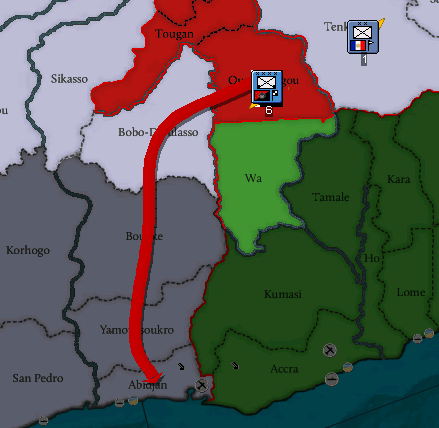  OLSON: There's still plenty of fight left in Africa, no? THOMAS: Not really. The port of Abidjan needs to be captured, but as far as we know, there's minimal resistance there. 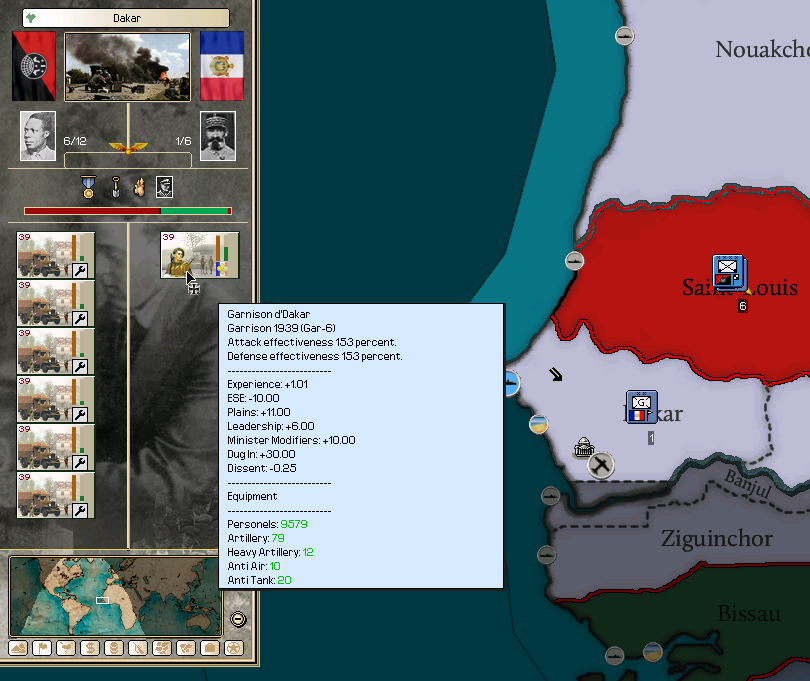 GITLOW: We wiped out the majority of what they had left in Dakar. 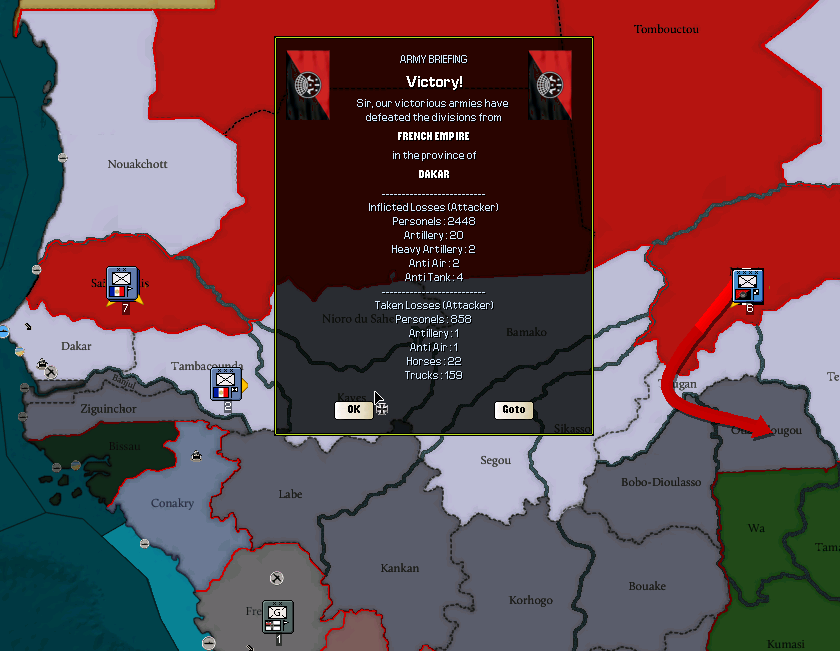 OLSON: If we were willing to threaten Napoleon with execution, we might force their surrender sooner. 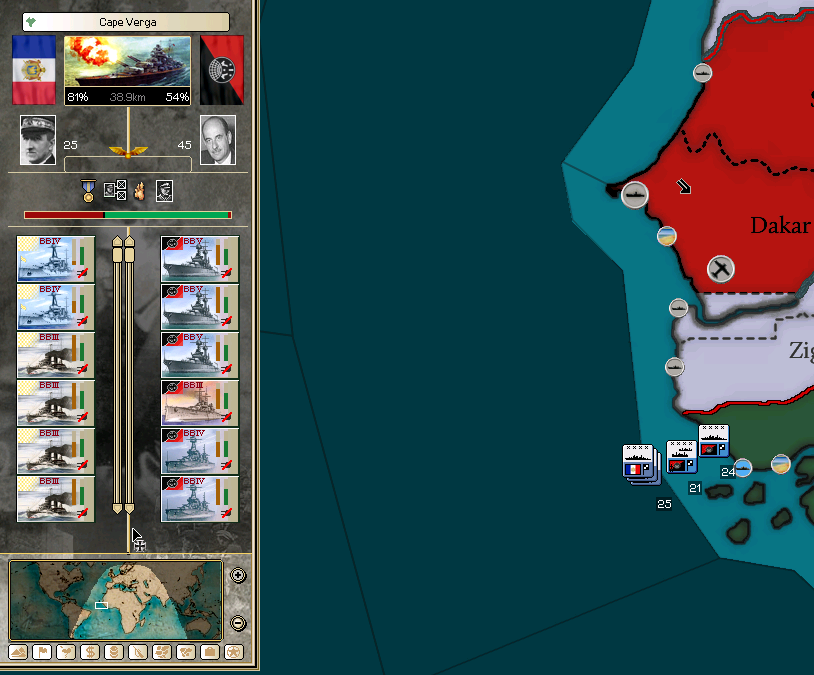 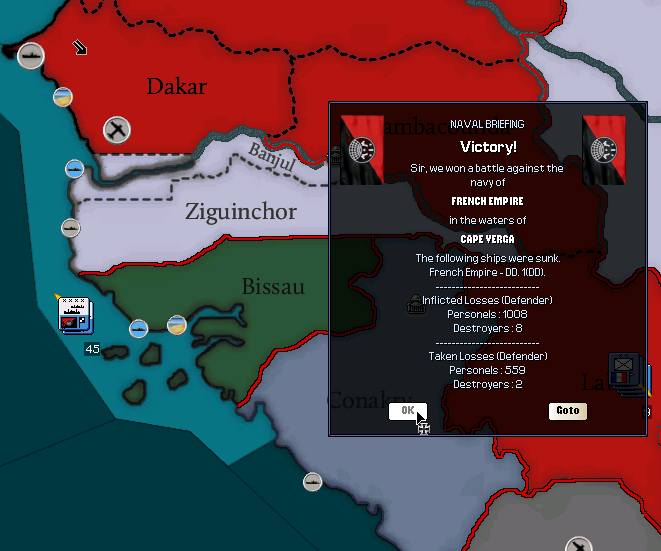 GITLOW: What's the point? Their fleet is already fleeing to Australia, and the remaining enemy probably fears the local population more than they do us. Napoleon is going to the FLN's custody once we find him. We already have an arrangement regarding him. A knock can be heard on the door. AIDE [muffled]: A message from Dakar. GITLOW [loudly]: Come in. 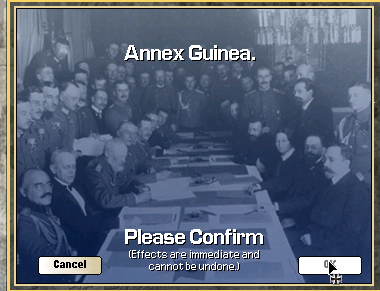 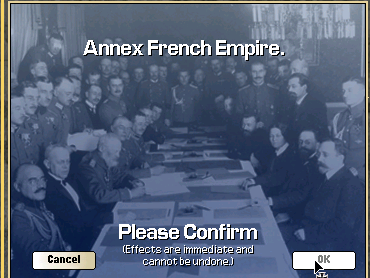 AIDE: Comrade Gitlow, I have a message from Comrade Law to Comrade Thomas and yourself. GITLOW: Continue, Comrade. AIDE: Your previous orders were misinterpreted by the man I sent to the Southern Palace. Stop. THOMAS: Misinterpreted how? AIDE: The message continues. Napoleon was transferred to the custody of a Dakar chapter of the African Section, and not the FLN. Stop. GITLOW: Well, that will be a bit messy, won't it? Now we have to explain to another group of wronged people why justice needs to wait. AIDE: Napoleon was beheaded this morning before we could establish contact- A loud thud can be heard, possibly a fist on a wooden table. GITLOW [very loudly]: Son of a BITCH! AIDE: Is that not good news, Comrade Gitlow? GITLOW: No. It isn't. AIDE: I don't understand. A vile imperialist is dead! GITLOW: Let me ask you something, Comrade... AIDE: Phillips. GITLOW: Phillips. Who rules most of Europe? AIDE: Germany? GITLOW: Monarchs. Sweden, Norway, Denmark, the Netherlands, Poland, Hungary, half of those stupid little members of the Italian Federation. They're all monarchs. Who did we just behead in Dakar? AIDE: A monarch. GITLOW: That's why we let Edward out of our grasp when the Australians plucked him out of Vancouver. A submarine tailed him all the way to Sydney. Hell we could probably go put a ten-inch shell through his bedroom window tomorrow if we felt like it. But we didn't and we won't. Not yet. Monarchs don't usually trust other monarchs, but they have a kind of understanding among themselves that they'll be left in comfort even if they are enemies. A headless monarch is exactly what will drive all those other petty kings and dukes into the arms of the Kaiser. AIDE: I understand. Do you need me to send a message to anybody? GITLOW: No, I'll handle it. Thank you, Comrade. And don't speak a word of that to anybody, obviously. AIDE: I won't, Comrade. The door can be heard closing. OLSON: Can we keep this from becoming a huge story? THOMAS: Doubt it. Dakar is chaotic, we barely have control over it. Word is certainly going to get out and it's exactly the type of news item that reactionary newspapers will put on the front page. OLSON: Could we spin it as a mob out of our control? GITLOW: Doesn't make a difference if we did it ourselves or not. They fear the working class achieving consciousness and going after them in their homes. We are the ones who inserted ourselves into African affairs, we are certainly going to get blamed for it. OLSON: Well, I'll see what we can do to prepare for the protests that are bound to come through to us in the next week. GITLOW: Yes, do so, but from now on, work within the framework that war is inevitable. THOMAS: You think so? GITLOW: Yes. We can buy ourselves time and position for it, but we can't avoid it anymore. Tape of meeting between Floyd Olson and Ambassador Georges Bonnet, Chicago February 15th 1942 - Declassified 1992 OLSON: Comrade Bonnet, it is always good to see you. BONNET: And you, Comrade Olson, though I wish it were under better circumstances. OLSON: What can I help you with? BONNET: I've received a number of questions from Paris, I was hoping to see what America's response is. OLSON: I'll do my best. BONNET: Let's start with the simple stuff. How goes the fighting in Africa? 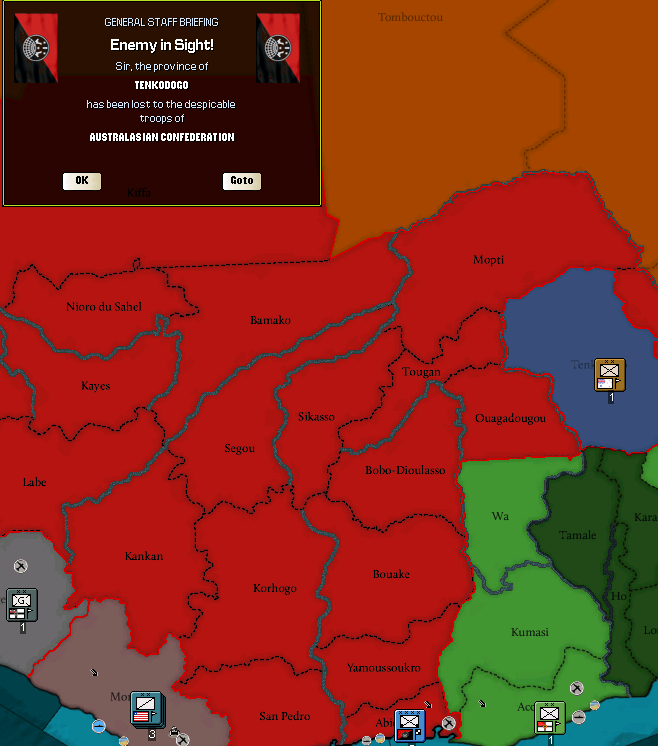  OLSON: Just about over. The Australians are making a nuisance of themselves, but we can handle it well enough. One division refused to surrender to the north, but they are trapped and the locals are obviously refusing to assist them. 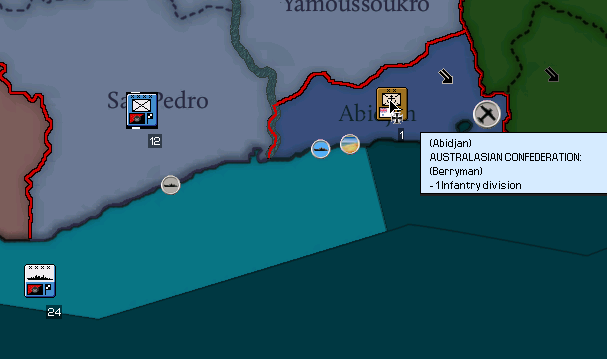 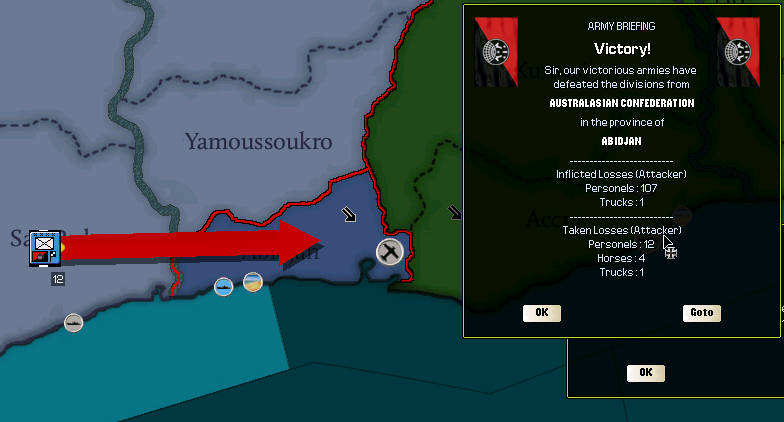 OLSON: They also attempted a raid on Abidjan, but with the distance involved, they can only hope to divert some of resources to defend the port until indigenous forces can take over.  BONNET: Do you require any French assistance in the matter? OLSON: No, nothing that we can't deal with. We just recently dispatched the Abraham Lincoln Corps as well as the first contingent of the joint Quebecois-Canadian force that we spoke of last year. BONNET: How is that working out? OLSON: No combat so far, but the Canadians have contributed a significant amount of armor to the effort, so they should be effective when we need them. BONNET: I suppose Buck is good for something. 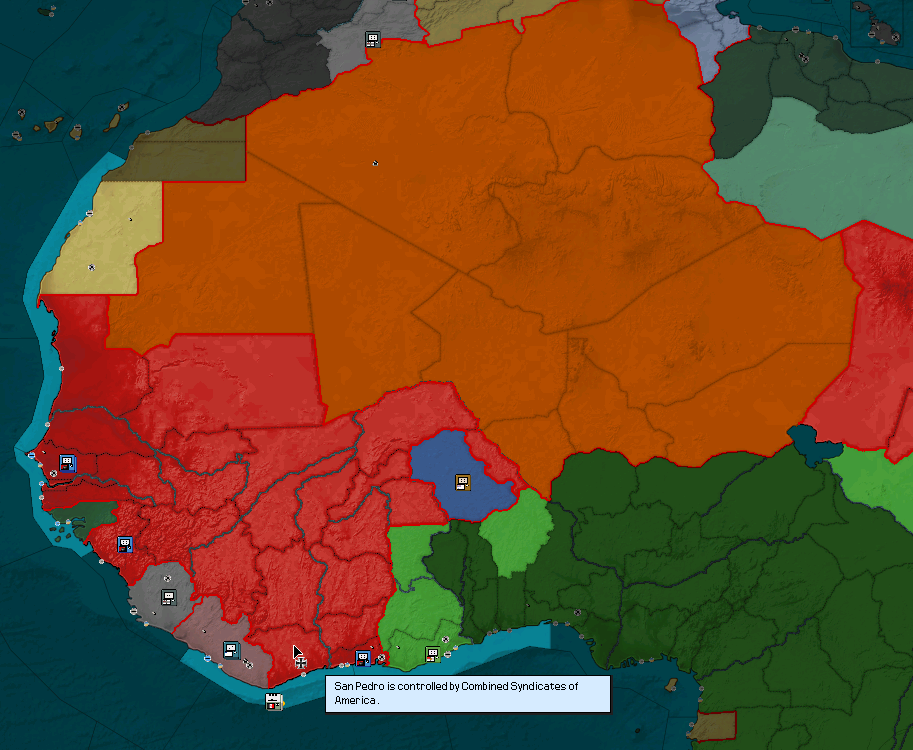 BONNET: Alright, enough of the easy answers. There is a great amount of [pause] concern in Paris about the reestablishment of the Tuareg Federation. It is hard to swallow that slavery will persist under our supervision and with our effective endorsement. OLSON: Nobody is happy about it, believe me. I don't know if I would have signed off on that deal if it had ever come to my desk, but Comrade Law did what he had to to ensure the safe passage of his troops across the Sahara. I have never met a Tuareg in my life, but everything I've learned about them since suggests to me that we can't do a damned thing about some of the things that go on. BONNET: We would run the risk of turning them completely against socialism if we tried, is what you're saying? OLSON: It feels like a new version of what the imperialists espoused to me. To them, what is the difference between a white man promising Christ will save them and a white man promising socialism will save them?   BONNET: That makes sense. What of the rest of the southern territories? OLSON: Our current plan is to split it into two new states. Two brothers who were exiled from the German colony were the most active in coordinating local resistance and have been our main go-between with the chiefs. We think they would be a good choice to help us arm indigenous forces that we could use against Mittelafrika if need be. BONNET: I worry that we are playing with fire here. Drawing up nations out of thin air seems dangerous to me.  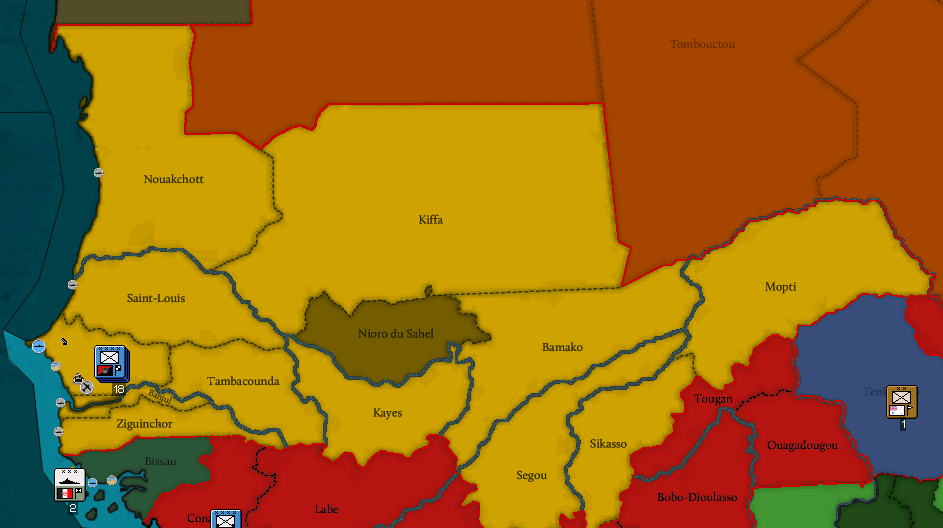 OLSON: It's a tricky question to be sure. I think we are going to see something profoundly different as African socialism takes shape. The rest of the territory I think we'll have less to deal with. There's already a united front emerging between Leopold Sedar Senghor, who I'm sure you've heard of- BONNET: Yes, yes, interesting man. OLSON: -and Moktar Ould Daddah who has forged a multiethnic alliance in Mauritania. I think the two of them working together will bring good results. BONNET: How about over the long term? OLSON: Of course, we are going to try and divest ourselves over time, but not until such a time that Germany is evicted from Africa. BONNET: Naturally. The African Section is growing more powerful by the day. OLSON: Indeed, they are. 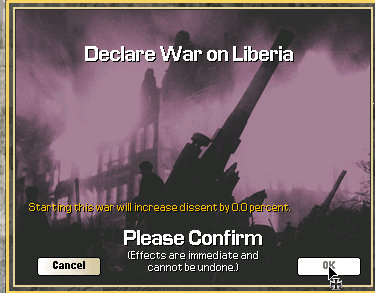 BONNET: What of Liberia? OLSON: The government does not care for us at all, the remnants of Firestone still operate there, trading with the Germans mostly, and they are a major source of funds to the government, even after the indigenous coup. They have accepted a large number of imperial exiles, and of course we are harboring a great deal of anti-government socialist fighters. We may have to go in ourselves to prevent them from interfering with our efforts around the area. 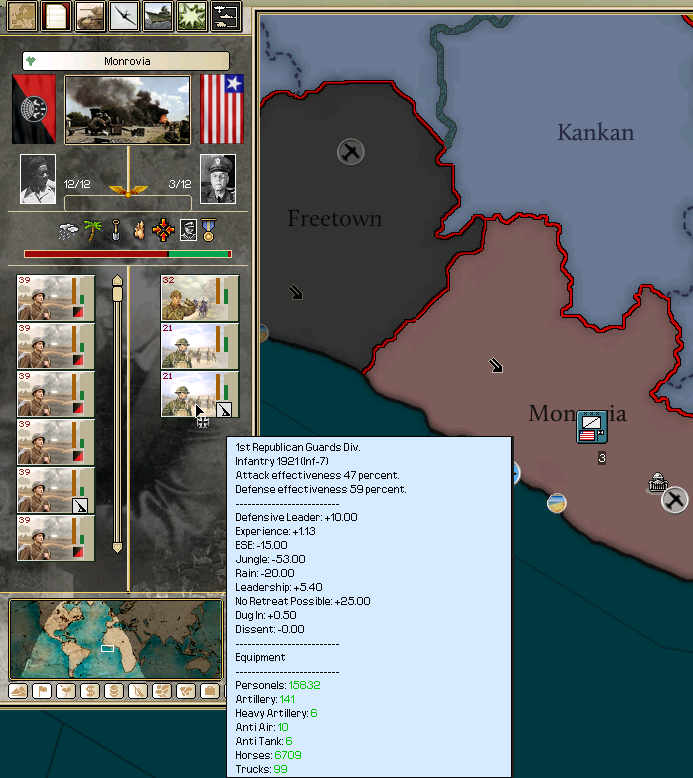 BONNET: Another provocation to the Germans might be unwise so soon after what happened in Dakar. OLSON: We're working on ways to cast the operation as an internal rebellion. The transfer of power from Amero-Liberians to the indigenous has blunted some of the people's anger, but there is still significant activity that we could utilize to our advantage. We are considering a number of things, perhaps even sending in Negro volunteers under their uniform. 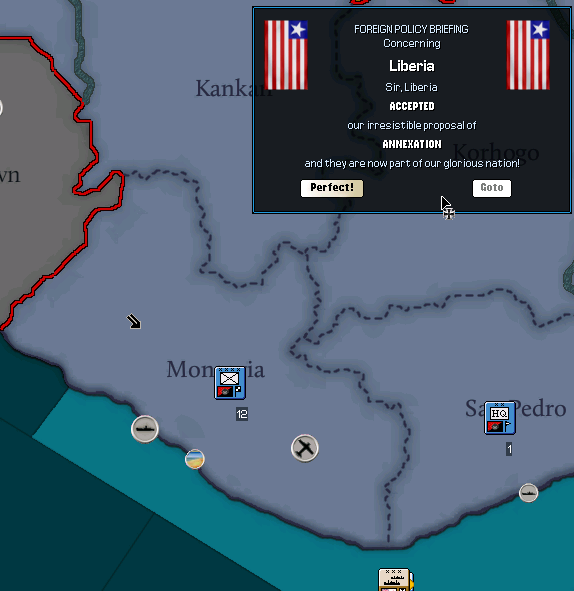 BONNET: It is not our intention to tell you what you can and cannot do regarding Africa. We would just appreciate notice so we can prepare if it does turn out to be the last straw. I'd like to believe that the elections next month in Germany will cause their government to hesitate. Once we get to the summer, though... OLSON: Anybody's guess. BONNET: Precisely. Berliner Morgenpost, March 26th, 1942 ZENTRUMPARTEI VICTORIOUS DKP SWEPT OUT, SPD FLOUNDERS AGAIN, A NEW DAWN FOR THE REICH? 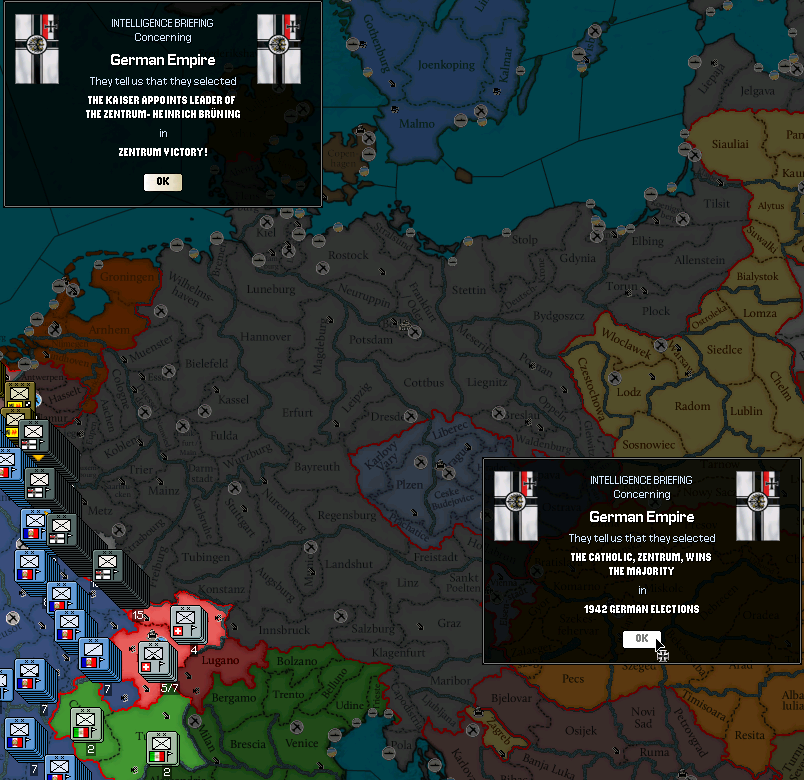 I loaded up as Germany and reduced their dissent to zero. It was previously at around thirty percent. The ruling DKP will not soon forget the beating it took this year, losing its majority to the Catholic Zenstrumpartei. Voters rejected the DKP's insistence that all was well in the Empire, fed up with the continuing sluggishness of the economy, the brash aggressions of the Internationale and a failure to deliver on its promises of 'restoring the glory' they claimed was lost during the last SPD government. The SPD, who as recently as December held a commanding lead in the polling, only gained five seats of the one hundred and twenty seven lost by the DKP. The American invasion of Algeria last year caused support to swing from the ruling DKP to the SPD, as the DKP's blustery threats against America resulted in no concrete action. The SPD then insisted that the Internationale was concerned only with defending itself and that a second Great War could be avoided. The execution of Napoleon in Dakar in January caused an explosion of anger against the Internationale that the SPD was unable to handle. Amidst the chaos arose the Zentrumpartei, who polled only ten percent in January and took fifty five percent of the vote in the election.  The party's support has historically been limited to Catholic populations, but the collapse of the DKP has allowed the party to make huge inroads in the Protestant population, and a surprising level of support from the Jewish population. Newly appointed Chancellor Heinrich Bruning has promised to include Protestants and Jews in the administration, claiming that "all Germans have a stake in the Empire's prosperity." Many liberal parties are throwing their support behind the Zentrumpartei as well, even though there is no immediate political advantage for them to do so. The result is a broad coalition that can push through legislation at will. Chancellor Bruning has presented a comprehensive package of measures to boost the economy's growth already, but all eyes are on what the new government will do about the Syndicalist problem. The party has spoken of a need to speed up armament as well as seek out new allies. "Old animosities should melt away in the face of new threats. We will not plunge the nation into war, but we will be prepared if it comes." the new Chancellor proclaimed in his first speech to a raucous Reichstag. "We no longer live in an age where moral Christian empires can stand apart and compete amongst themselves. It is no longer a question of which nation will dominate Europe, but which civilization will survive. The moral peoples of the world must unite against those who have fallen into depravity. There must be leadership, and only Germany has the strength and character to lead." csm141 fucked around with this message at 23:45 on Aug 9, 2015 |
|
|
|
Please timg those, it's making the post impossible to read.
|
|
|
|
Kavak posted:Please timg those, it's making the post impossible to read. This is why you separate the original screenshots and the cropped versions into different folders, friends. Should be readable now.
|
|
|
|
Beheading monarchs is the most important thing you can do in Paradox LPs, if you ask me.
|
|
|
|
Something tells me France isn't going to be too happy about the Combined Syndicates accidentally causing a war with Germany. Also, what happened with Austria in this timeline?
|
|
|
|
ThaumPenguin posted:Something tells me France isn't going to be too happy about the Combined Syndicates accidentally causing a war with Germany. Somebody's gotta do it! If I leave everything alone and wait for things to start on their own, which makes more sense from a storyline perspective, the war won't start until France has nuclear weapons, which could be 1945. Sometimes the game needs a kick right in the rear end and for the player to fill in the narrative themselves. quote:Also, what happened with Austria in this timeline? Some kind of death spiral loop of the 'Austria Wants to Join Us' and 'Liberate a Friendly Austria?' events. I'm not sure how we ended up with mini Austria.
|
|
|
|
Can't wait to see what starts the fire.
|
|
|
|
Rincewind posted:Beheading monarchs is the most important thing you can do in Paradox LPs, if you ask me. Behead every monarch in CK2 
|
|
|
|
Rincewind posted:Beheading monarchs is the most important thing you can do in Paradox LPs, if you ask me. agreedo
|
|
|
|
Today Dakar, tomorrow Sydney! 
|
|
|
|
I'm guessing the Detroit anarchist papers are overjoyed about the African Section forcing the hand of the revisionist CSA with direct action 
|
|
|
|
It's basically just Delhi and Australia left in the Entente, isn't it? Has anything moved in India?
|
|
|
|
paragon1 posted:It's basically just Delhi and Australia left in the Entente, isn't it? Has anything moved in India? Yeah, just those two and Hawaii left. As far as India goes, the Federation and Commune are still at war and the front has been basically stagnant the whole time, with the Commune having made a few small advances at first. Delhi is neutral in that conflict and I'm funneling military blueprints and supplies to the Commune to try and give them an edge. I couldn't add them to the alliance if I wanted to but if I did, they would be attacked by Delhi and would probably fall before I could move enough assistance over there. Assuming my forces would make it past Australia's rather large navy. Until then it's well wishes.
|
|
|
|
Chapter Six: Towards the Abyss (April-August 1942) DARKEST HOUR: A HEARTS OF IRON GAME Created by Paradox Development Collective - Stockholm, SCA Version 1.5b - Released October 2, 2014 IN A WORLD WHERE IDEOLOGIES CLASH- [Skip Intro] [Start New Game] [Load Game] [Tutorial] [Mod Manager] [Options] [Exit] Choose a scenario: [January 1, 1936 - The Grand Campaign] [November 11, 1936 - American Civil War] [July 8, 1940 - The Great North American War] [April 1, 1941 - Operation Torch] [June 1, 1942 - Calm Before the Storm] [More Coming Soon!] Loading scenario... Briefing: Europe teeters on the brink of all out war. American action in West Africa has increased tensions between Germany and the Internationale to a boiling point. The Internationale plots to topple the German Empire, their most hated foe. The industrial might and seemingly limitless resources of North America makes the Internationale a greater threat than ever before, bolstering the confidence of the revolutionary alliance that it just may strike down the Kaiser. Across the trenches, Germany is busy with machinations of its own. The radical change sweeping the globe can only be stopped by the Empire, and the new Chancellor is busy reviving dead alliances and forging new ones. Will the continental Prague Pact be able to push the revolution out of Europe for good? Or will the Internationale raise their red banners in Berlin? Click on a Nation to View Details 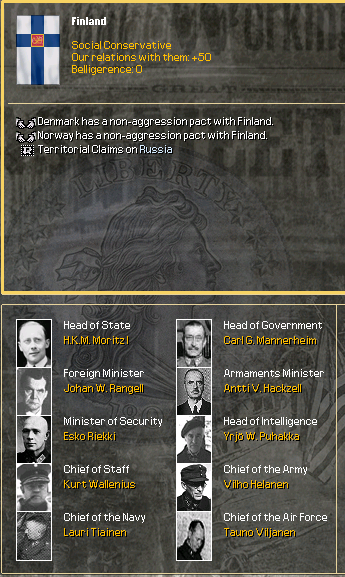 [Finland] Neutral Difficulty: ****O The independent Kingdom of Finland has managed to steer a course mostly independent of Germany, Russia or Sweden in recent decades. The far-right Lapua movement has faded from prominence and the kingdom is in the capable hands of Carl Mannerheim. With tensions in Europe rising to levels not seen since the Great War, perhaps now is the time for Finland to strike at its former master to the east and ensure that no foreign power ever dominates this proud nation again.  [Bulgaria] Neutral At War With: Serbia, Romania Difficulty: ****O While the rest of Europe hurtles towards war, southwestern Europe has been embroiled in it for years already. The Fourth Balkan War rages, and Bulgaria is valiantly defending against two enemies on two fronts. Will the Kingdom endure?  [Turkestan] Neutral Difficulty: ***OO The collapse of the British Raj and the Russian Empire heralded the end of the Great Game in Central Asia. The void was filled in convincing fashion by Turkestan. The ruling imams pledge to unite the Muslim world, a compelling vision in a world gripped by uncertainty. Persia and Alash Orda have already fallen to the burgeoning empire and the other small states in the region should be easy prey. A divided Russia to the north, the derelict Ottoman Empire to the southwest, the Afghans to the south. There are many targets for the fundamentalist state, but the fire of jihad may yet be quenched by the ascendant Qing Empire in the east. Zeal may not be enough to guide the newest Islamic empire in these complicated times. 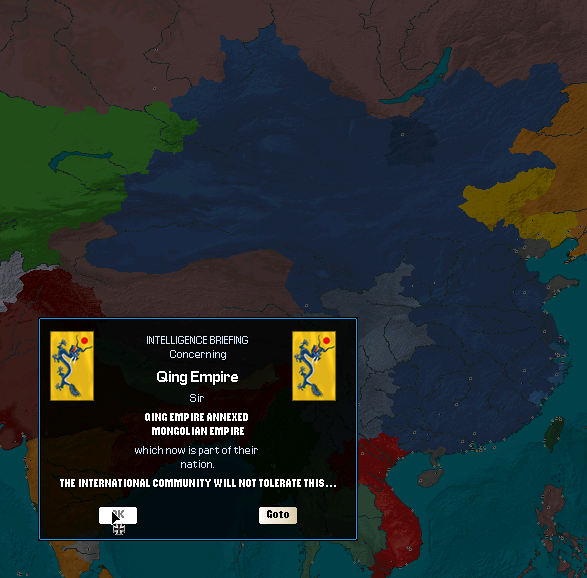   [Qing Empire] Neutral Difficulty: **OOO Only two decades have passed since the Qing Empire was reborn as a pawn of the Kaiser. In that time, the Qing Empire has grown from a buffer between Japanese and German interests into an empire that can truly be called China. The Mad Baron Sternberg hangs, the German administrators have been evicted from the south, the Shangqing rebels defeated in the mountains. Even Portugal and the international port cities have been forced to acknowledge that China is no longer their economic playground. China is still fractious however, as a republican faction controls the southwest, the Tibetan monks continue to endure, and most importantly the technologically advanced Japanese and Germans will not give up their possessions so easily. In order to truly unite China, the Qing Empire must be prepared to fight.  [Kingdom of Spain] Neutral At War With: Carlist Spain Difficulty: ***** The Spanish Civil War rages on, and while the syndicalists were defeated, the Carlist faction has entrenched itself in the north of the country. While the Loyalists retain most of the country, it will take much more sacrifice to put an end to the civil war once and for all. And Spain doesn't have much left to sacrifice... 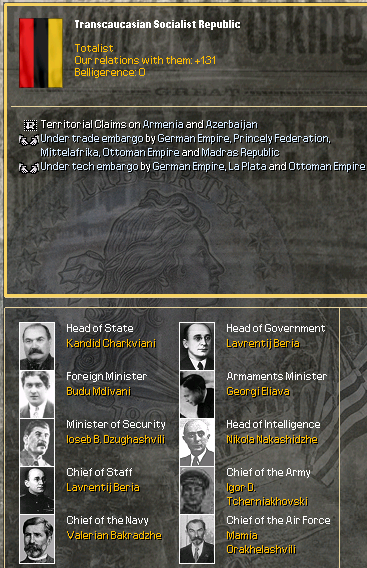 [Transcaucasian Socialist Republic] Neutral Difficulty: ***** The TCSR, formerly known as Georgia, is one of the few socialist countries to have embraced Totalism. The ruthless Beria and his henchman Dzughashvili have systematically eliminated all opposition to their rule. The syndicalist mainstream of the Internationale prefers not to acknowledge the rumors of atrocity in the forgotten corner of Europe. It is easier for Paris and Chicago to forget about the isolated mountain republic. The TCSR cannot count on anybody's support in their quest to expel Russian, Islamic and Ottoman influence from the Caucasus. Will they succeed in their mission, or will their larger neighbors put an end to the Totalist dream? 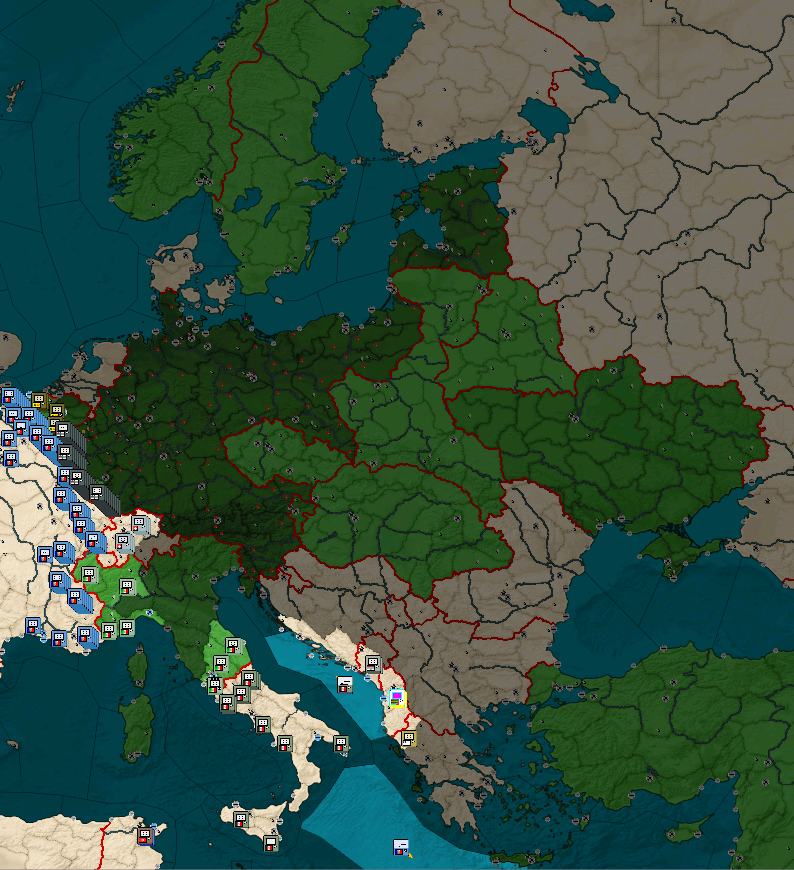 [Germany] Prague Pact Difficulty: *OOOO The German Empire has been the dominant imperial power in the world ever since revolution toppled their French and British rivals. Her fleets sail every sea, her colonial possessions now stretch across most of Africa, and what may be the best equipped and trained army in the world stands to defend their Kaiser. But now the revolution has gathered steam, and the resources and industrial might of North America may come into play in what seems like an inevitable clash with France and the Internationale. Germany has sought to strengthen her position by uniting the conservative states of Europe into one alliance, the expansive Prague Pact. The long predicted clash between syndicalism and capitalism is approaching, and for the aristocrats of the German Empire, it is literally a matter of life and death. 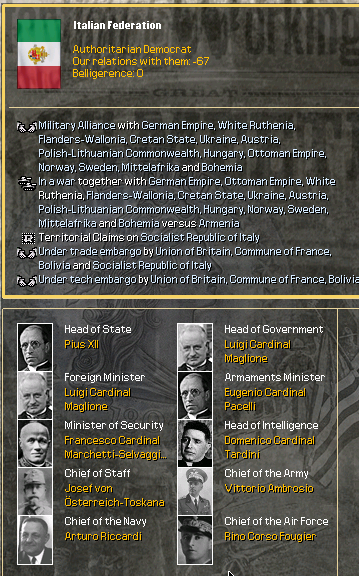 [Italian Federation] Prague Pact Difficulty: ***OO Envisioned as a rump state to protect the southern flank of the Austrian Empire, the Italian Federation has not only outlived the Austrian Empire but has grown into one of the most important members of the German alliance. Led by a pope wielding temporal power not seen since before Napoleon, the Italian Federation has united and consolidated into a regional power. Across the French Alps and just south of Rome lie the armies of the Internationale, who seek to seize such historic cities as Milan, Venice, Florence, Genoa and Rome for themselves. Pope Pius XII is resolved that the syndicalist regime in Napoli will not desecrate the Vatican in Rome, and leads daily prayers that the syndicalists be wiped off of God's Earth. His Holiness just may need a miracle to save Italy. 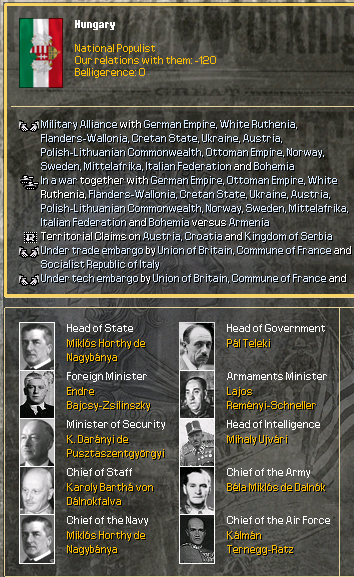 [Hungary] Prague Pact Difficulty: ***OO The collapse of the Austrian empire filled Europe with uncertainty as to what may happen in Southwestern Europe. While the opportunistic Serbs may have gobbled up Croatia and Bosnia, much of the defunct empire's territory is still defended by its second most important constituent. Hungary has come out of the fray as a strong regional power, under the control of a far-right regime led by Miklos Horthy. The xenophobic regime may offend some sensibilities in Germany, but its ruthless anti-syndicalism is appreciated by the Prague Pact. With the support of Germany, Hungary could very well become a major power in the Balkans, as its neighbors squabble amongst themselves. First though, they will have to make sure their new-found benefactor does not fall to the Internationale. 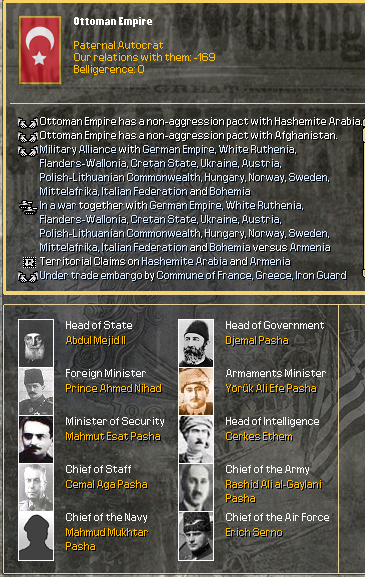 [Ottoman Empire] Prague Pact At War with: Armenia Difficulty: ***OO In a time of crisis, Germany has turned once more to an old ally. The economic ties between the Ottoman and German Empires mean that Istanbul's fate is intertwined in that of Berlin. If Germany falls, the Ottoman Empire would be alone in a dangerous world. The fundamentalist Turkestan seeks to establish itself as the undisputed leader of world Islam as it knocks on the gates of Mesopotamia. The fires of Arab nationalism burn in Cairo and Totalist schemes brew in Tbilsi. The Ottoman Empire needs Germany to survive these trying times. Germany just may need the Ottoman Empire as well. 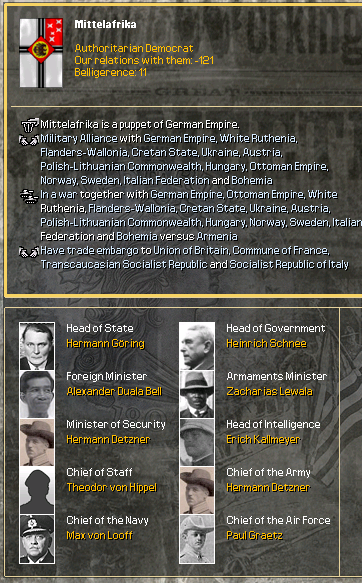 [Mittelafrika] Prague Pact Puppet of: Germany Difficulty: ****O Perhaps no member of the Prague Pact has more to fear from the Internationale than Mittelafrika. The Internationale aims to end colonialism across the world, and they regard the German settlers and administrators of Africa as criminals of the highest order. The Americans are ready and willing to assist socialist resistance groups throughout the German colonies, and even if Germany succeeds in Europe, they will be hard pressed to reestablish control in Africa. Mittelafrika cannot count on the motherland now. They must stand on their own. 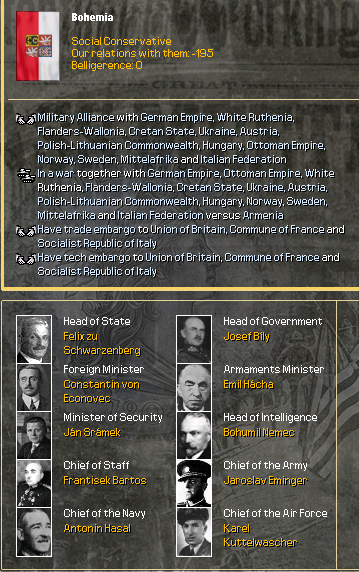 [Bohemia] Prague Pact Difficulty: **OOO Once the wealthiest subject of the Austrian emperor, the new republic of Bohemia hosted the conference that gave the Prague Pact its name. The Internationale is not likely to distinguish between monarchy and bourgeois republic if it takes over Central Europe, and so Bohemia has put its faith into another German emperor. Bohemian men will fight in Germany in the hopes that they won't have to fight at home. 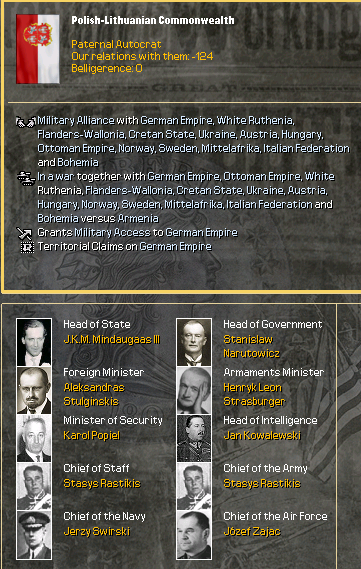 [Polish-Lithuanian Commonwealth] Prague Pact Difficulty: ***OO The fact that the PLC agreed to the terms of the Prague Pact is the greatest sign that the threat of syndicalism is powerful enough to overshadow any enmity between the monarchies of the world. Poland defied Germany by absorbing Galicia during the Austro-Hungarian Civil War and engineered a union between itself and former German subject Lithuania. Despite all of that, Germany is prepared to forgive and forget in exchange for Poland-Lithuania's support against the syndicalist alliance. The Commonwealth may still desire Germany's Polish territories, but the prospect of French armies overrunning Warsaw is enough to make both sides set aside their differences against a common enemy. 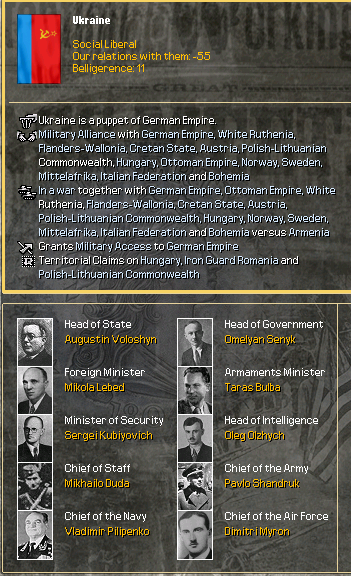 [Ukraine] Prague Pact Puppet of: Germany Difficulty: ***OO Ukraine lies at the intersection between three major powers. The Prague Pact desires its agricultural production and manpower to endure a syndicalist assault, the battered Russian state desires to ascend to its former glory, a path that could go through Kiev, and the Internationale has a unique desire to see Ukraine return to the folds of the syndicalist alliance. The formerly Ukrainian leader of France's anarchist faction, Nestor Makhno, seeks to see his homeland liberated, and the exiled socialist government of Nikita Khrushchev plots in Paris to return to Ukraine. Ukraine has a large, if obsolete, army to serve the Prague Pact's cause. But the Ukrainian people have laid down their lives for two failed revolutions, and Germany better hope that they not give it a third try. 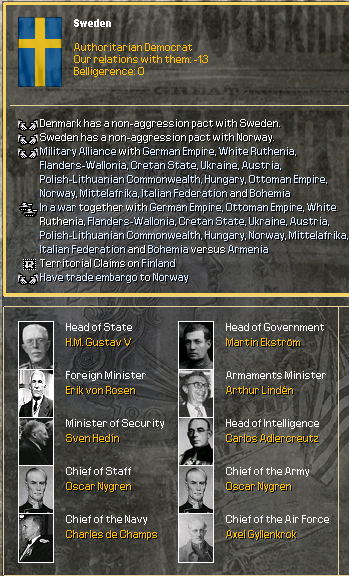 [Sweden] Prague Pact Difficulty: ***OO Scandinavia has spent much of the last century being neutral in European affairs, but the stakes of the coming war are too high for Sweden to stay on the sidelines this time. The right wing regime of Martin Ekstrom has slowly and surely marginalized all domestic opposition while forging new ties with the German Empire. Sweden does not have the experience in modern warfare that most of Europe has, but Sweden brings significant technological savvy and natural resources to the fight. It's been over a hundred years since the Swedish Empire ruled the north, and perhaps it may again. 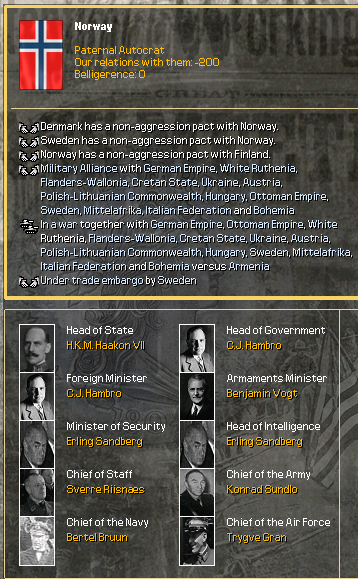 [Norway] Prague Pact Difficulty: ****O While other monarchies in Europe may think that Germany is the only protection they have against the Internationale, Norway has already once been saved by the intervention of the German Empire. Only a few years ago, the Union of Britain attempted to install a syndicalist regime in Oslo through force, and only the threat of retaliation by the German Empire convinced the British to turn the boats around. The strategic importance of Norway cannot be underestimated for either side. Norway's naval bases could be the key to controlling the North Sea and as the gateway to Scandinavia, it could be a way for the Internationale to attack their mortal enemy from the north. Scandinavia can no longer expect to be left out of the battles that will define the future of Europe and the world, and Norway must be prepared to fight.  [Union of Britain] Syndicalist Internationale Difficulty: *OOOO The Union of Britain has so far avoided an ironclad military commitment to their continental comrades, but it is clear to all that Britain will not allow France to fall without a fight. Britain's naval and air power are a crucial component of any syndicalist strategy in Europe, and without the mighty Republican Fleet, it is questionable if the armies and resources of North America will even make it to Europe. Britain has been involved in many struggles for European dominance before, but none had the implications that this one does. If Britain loses, there will not be any peace settlement. Britain will either defeat Germany, or the revolution will be over. 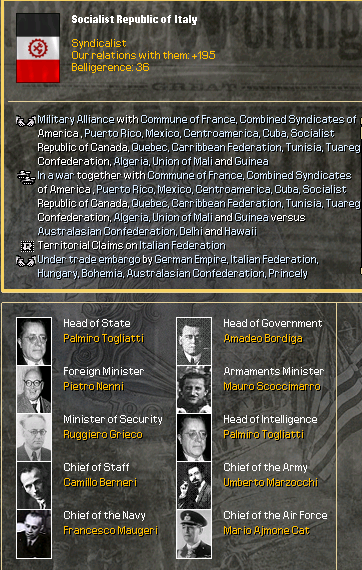 [Socialist Republic of Italy] Syndicalist Internationale Difficulty: ****O The SRI has stood by its French ally since its own revolution. The Italian syndicalists seek to unite the peninsula once more, and to expunge papal and bourgeois influence from their nation. In their path is the more powerful Italian Federation, which controls the industrial centers of the north. With the help of France and America, the Eternal City could be flying red banners soon.  [Commune of France] Syndicalist Internationale Difficulty: *OOOO The rivalry between France and Germany is as old as Germany itself. The German Empire was forged over the corpse of the Second French Empire, and it ascended to global dominance over the corpse of the Third French Republic. Now the rivalry has transcended imperial interest and balance of power. The revolutionary syndicalism of France and the conservative monarchism of Germany cannot coexist any longer. Either the revolution or the Empire will die. France, once prostrated and broken, has rebuilt and rearmed. And with the support of new allies, France has a better chance than ever before to finally defeat its archrival. The cost for France will be exorbitant, win or lose. But such is the price of revolution. 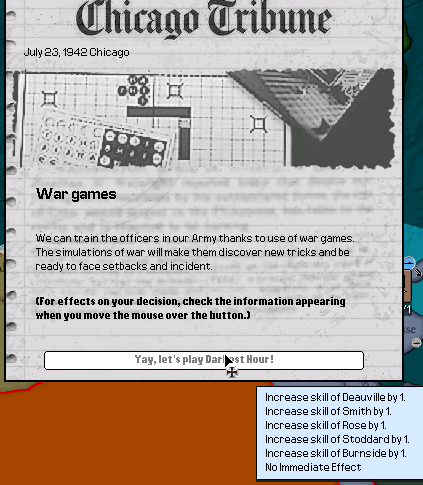 [Combined Syndicates of America] Syndicalist Internationale At War with: Australasia, Hawaii, Delhi Difficulty *OOOO Some say that the coming war has been won already. With the industrial and natural wealth of North America in the hands of the Internationale, even a victory over France will not be enough for the Germans to expunge syndicalism from the world. America has gone from a forgotten great power crumbling in 1936, to a bona fide world power in 1942. A military untested since the 19th century has grown into one of the world's largest. It has defeated the Royal Army in Canada and united North America under its leadership. It launched an invasion across an ocean and toppled the Imperial French regime in Algeria. Now German war planners sit and wonder as to what America is planning. The American military has not set foot in the Old World since its battles with Barbary pirates over a century before, and nobody knows what to expect. Will America's lack of martial expertise betray it in a battle with a modern military? Or will America surprise the world again? Loading map... Reading save file... Whichever faction has the most victory points by January 1, 1964 will be the victor. [Start]  Sir, our fleet in North Phoenix Islands is under attack by: Australasia  Our fleet won the battle! Enemy losses: 3 BC, 1 CA, 11 CL, 7 DD Our losses: 5 SS New decisions are available! [Desert Equipment] - Available [O] 'Fighting in the Desert' has happened to us [O] We have enough industry to complete construction 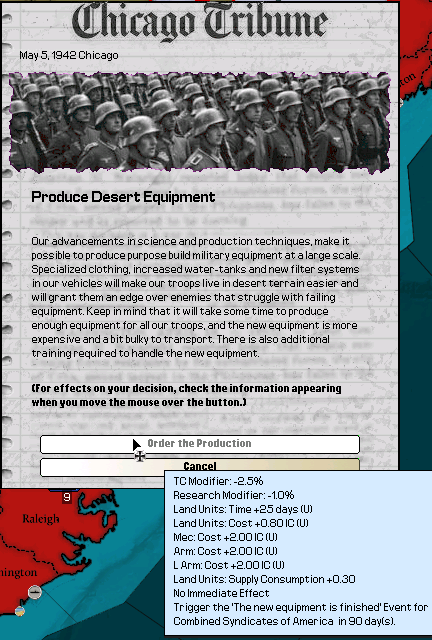 This will begin production of specialized desert equipment for your army. Are you sure? [Yes] [No] 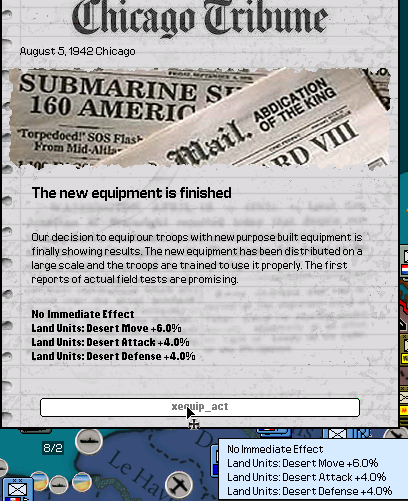 The equipment should be completed in 3 months. 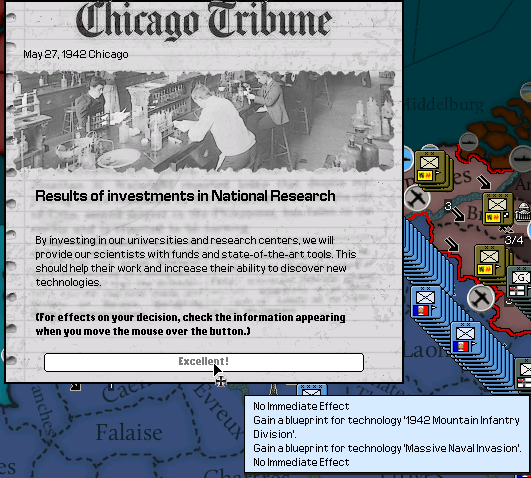 Research completed! Our scientists have made advances in Mountain Infantry and Amphibious Techniques. [War Plan Orange] - Unavailable [X] Pearl Harbor is under our control [O] Pacific States of America does NOT exist [War Plan Violet] - Available [X] Balboa is under our control OR [O] Balboa is under the control of Centroamerica [War Plan Black] - Available [O] Canada is NOT a member of the Entente [O] We are allied with France [O] Germany is NOT socialist [O] We have technology Amphibious Techniques level 2 Our finest generals have compiled a comprehensive plan to defeat Germany. Are you ready to go forward with it? [Yes] [No] Are you sure? There is no going back from this. [Yes] [No] Are you really sure? [Yes] [No] If you say so, Comrade. Good luck. csm141 fucked around with this message at 06:48 on Aug 26, 2015 |
|
|
|
Either we switched sides when I wasn't looking or the CSA is in the wrong alliance. With Europe now being the focus, what are our plans for Hawaii and Australasia? Leave them be until the Big One is done? Take out Hawaii so it doesn't become uncrackable?
|
|
|
|
You don't need luck when you've got America on your side!  
|
|
|
|
I am a boob and an idiot. We gave Hawaii a crack earlier, they're too strong and with Australasia's quite large navy flitting around the Pacific, there's too much heat to mount the level of offensive needed to crack Oahu. I need a larger navy and for Palmyra's airfield to be fully operational. They can't possibly threaten the West Coast (Centro America is garrisoning the whole coast) so they can wait.
|
|
|
|
Great update, very clever idea. I am looking forward to seeing it all kick off.
|
|
|
|
World Revolution begins today. Can't wait to see the in-universe explanation as to why the war begins!
|
|
|
|
The variety of update styles has yet to wear thin. Great job on all of this. Looking forward to seeing how it goes - the Prague Pact is certainly formidable.
|
|
|
|
I love how Ukraine retains its syndicalist flag for some reason.
|
|
|
|
GSD posted:I love how Ukraine retains its syndicalist flag for some reason. I like that DH has the flag switch functionality and KR could definitely use some more switching in its events and also just when releasing puppets. I would have liked to have the original socialist flag of Mexico when I released them. Basically I hope HoI4 and HoI4:KR has dynamic flag changes like V2 does.
|
|
|
|
Chief Savage Man posted:I like that DH has the flag switch functionality and KR could definitely use some more switching in its events and also just when releasing puppets. I would have liked to have the original socialist flag of Mexico when I released them. I think that's been confirmed for HoI IV, although I don't have time to root around the official forums to find the post. I remember seeing a screenshot of Britain with its V2 fascist flag, too.
|
|
|
|
Question for the modders, but where did you get the recording of the original version of the Red flag with the whiter cockade tune instead of ole tennenbaum?
|
|
|
|

|
| # ? Apr 19, 2024 12:25 |
|
Chapter Seven: War Plan Black (August 28th, 1942) The scene is in Chicago, it is late at night, the city is mostly quiet except for a few dedicated anarchists keeping the day's demonstration alive underneath the window of Benjamin GITLOW's office, who sits at a large oak table. Also seated are OLSON, THOMAS, TRESCA, HEMINGWAY, BONNET and MATTICK. The table is covered with maps, the mood is tense, the men are visibly exhausted.  GITLOW pushes small figures representing the French army back and forth across the map. He is silent but his face betrays that he is tortured by the decision facing him. GITLOW: Alright, we're getting nowhere. Each of you, give me your thoughts. Succinctly if possible. Ambassador, as our guest, you can go first. 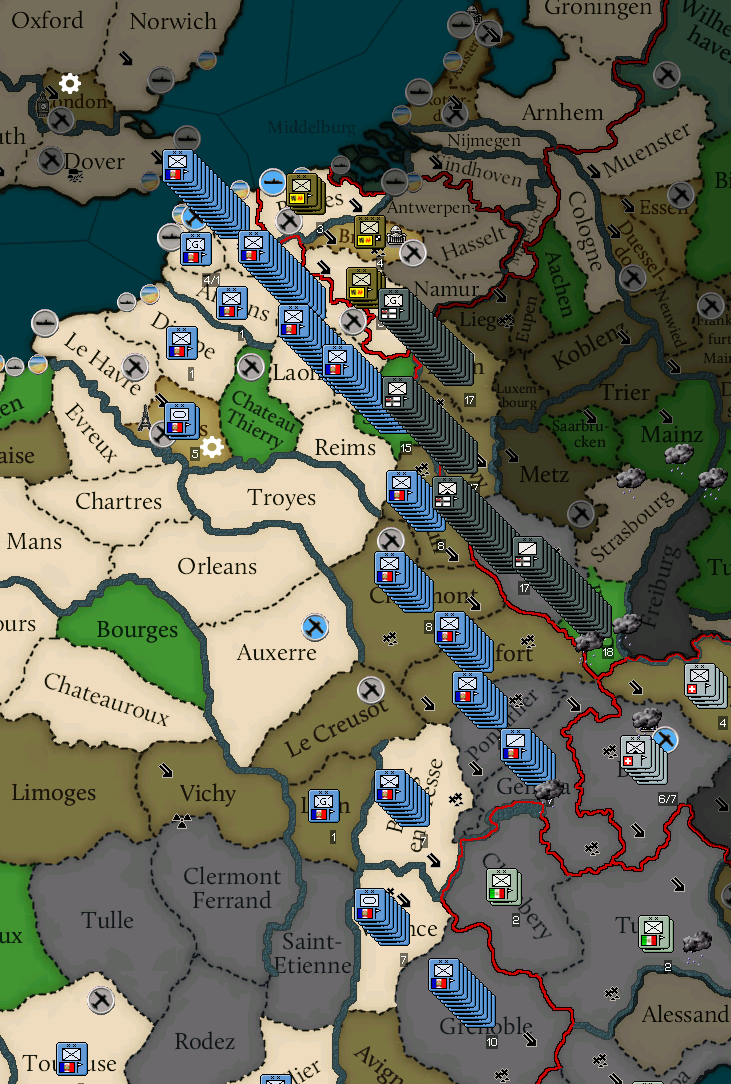 Ambassador Georges BONNET stands. BONNET (in accented English): Comrades, we are stretched to our limits in France. Virtually every able-bodied man and a good number of the women have been pressed into service, old men and teenagers work extra hours producing arms for the fight. I understand that America still shows the scars of revolution and that you have put your necks out already on our behalf. But I must ask you to help us once again. Mitteleuropa has the manpower to outlast and overwhelm us. If we wait, they will be able to arm the rest of the Prague Pact to German standards and overwhelm us. The only ways we can win the war is to man our trenches with American men or to win the war as rapidly as possible, before France loses so many men that we cannot replace our losses. We have a plan to bring the fight into Germany, but if their allies are left alone, then they will surely be able to regroup and push us back, and Paris will be lost. 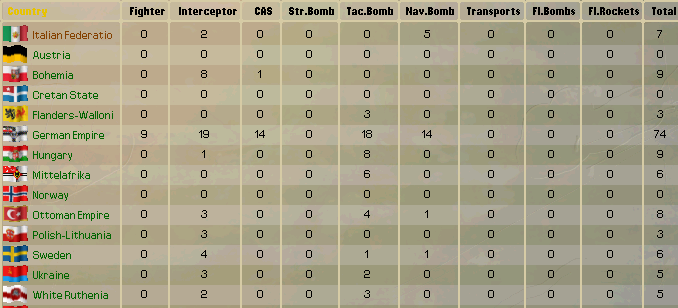  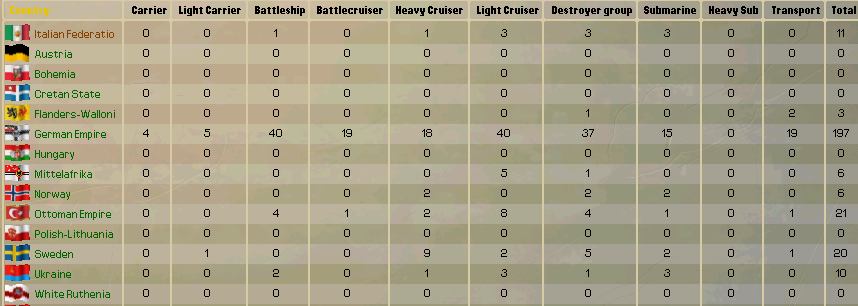 (I loaded up the save with nofog much later to get these numbers. I only had the intelligence estimates at the time.) BONNET sits. GITLOW: We cannot let Paris fall. Norman? Intelligence chief Norman THOMAS stands to pass out sheets of paper to each man at the table, then sits again. THOMAS: The newest estimates on enemy strength. Assuming the British can be counted on- BONNET: They can. MATTICK: Let's hope. The table is awkwardly silent for a moment, until THOMAS clears his throats and continues. THOMAS: The Internationale would have the ships to match the Prague Pact's naval strength. Britain's extensive fleet of land-based bombers could also be used over the North Sea. However, when it comes to the air, many of the lesser Prague Pact members have invested in their air force lately, and we should expect to be outnumbered in the air. Most importantly, we estimate Germany has about two hundred divisions, Northern Italy, Ukraine and Hungary each with about forty, Turkey with more than sixty, and the rest of the Pact with eighty between them. Over four hundred, half of which we can assured of high quality and training, the rest could be suspect, and we're unsure how quickly the Pact's infrastructure in the East can move those troops towards France. GITLOW: How does that compare with what we have? 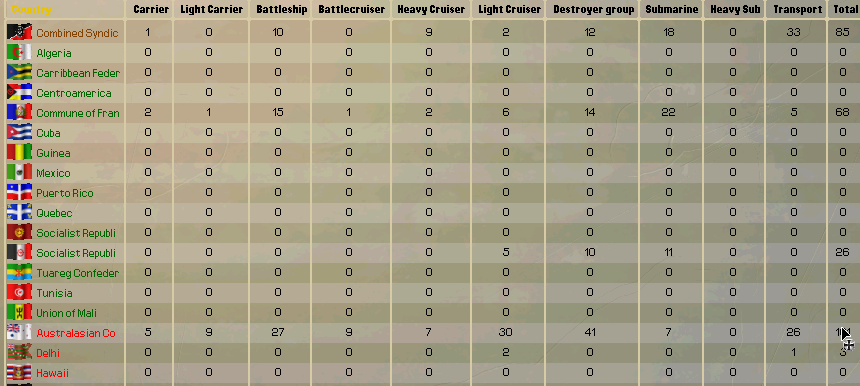  MATTICK: If I may, Norman? THOMAS nods. MATTICK: If we can't get our boys to Europe, then we're screwed. Our carriers and cruisers currently under construction would assure us naval supremacy. (Foreign Minister Floyd) OLSON: We don't have two years, Paul. MATTICK: We'll have nothing if we instigate a war and Paris falls because we only have the remnants of the old US Navy to escort our boys overseas. OLSON: Fine, but- GITLOW: Let him finish, Floyd.   MATTICK: We could use more naval bombers and fighters, and we're producing them right now. We're already trying to cover a lot of airspace with what we've got. 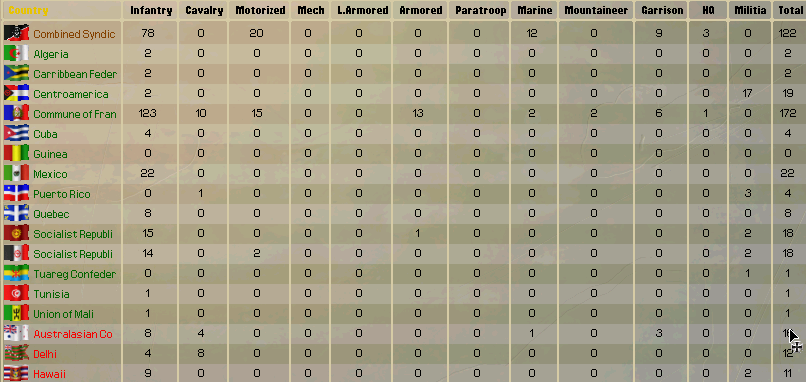  MATTICK: We've enough men on the ground on our own, but the OAS armies are coming together very well. I'm certain that they could be put to good use in France. GITLOW: I'm sure. Floyd? OLSON: The problem with Paul's assessment is that we do not have nearly that much time. Bruning has made a concerning amount of progress in the few months since he took office. He's put together the Prague Pact, he's settled the strikes that were plaguing German production, and we have unconfirmed reports that he is working on a way to put the animosity between Germany and the Entente to bed. THOMAS: To deal with the Entente fleets on top of Germany's? That could be too much to deal with. MATTICK: We're dealing with those fleets now though. They haven't caused us many problems thus far. THOMAS: That's because Australasia is buckling under the strain of providing for what amounts to three different navies combined into one giant refugee fleet. They don't have the resources to provide for long distance operations. They can keep us away from them and Hawaii and that is about the extent of their capabilities. OLSON: But if Germany assists them, we could see a great deal of those ships being used in Europe. And on top of that, Germany could attempt to bury the hatchet with Japan. An alliance between those three could spell trouble for us. BONNET: But if we strike soon, Bruning will not have the time to forge such an alliance. GITLOW: Carlo? (General Secretary Carlo) TRESCA: Nothing to add. GITLOW: Ernest? (Chicago Representative of the Supreme Commander Ernest) HEMINGWAY: We're ready to bring the fight to them. There is no better time than now. GITLOW: Alright then. What does everybody say? Do we do it? TRESCA: Yes. HEMINGWAY: Yes. MATTICK: No, wait. OLSON: Yes. Norman THOMAS remains silent. GITLOW: Norman? THOMAS: You know why I cannot say yes. But I will not say no either. GITLOW: I see no reason to delay any further. We risk too much by waiting. BONNET: So it is done? 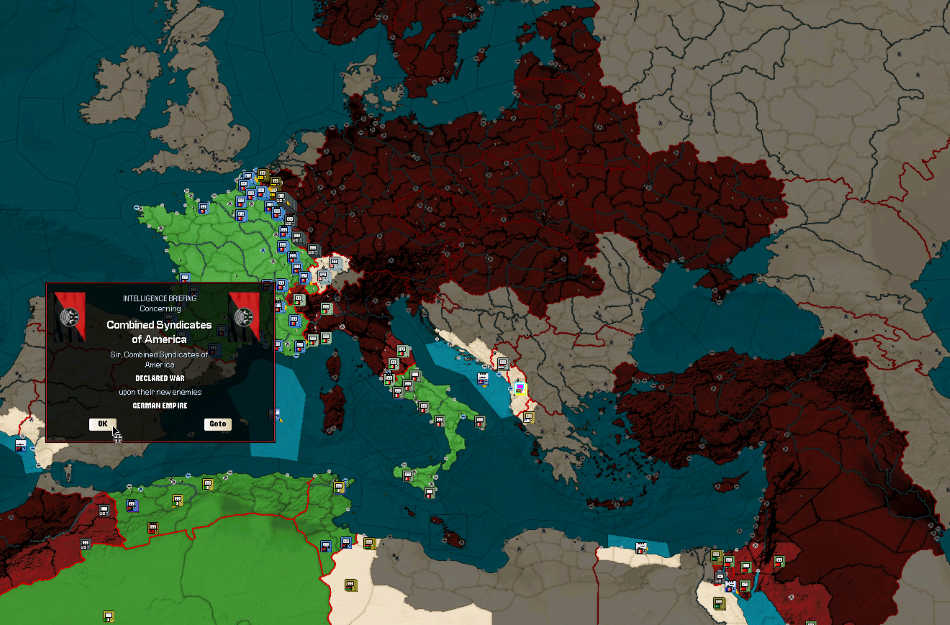 GITLOW: Yes, it is done. HEMINGWAY: There are some other specific matters of the plan that we ought to discuss. GITLOW: Let's go over the whole thing. Just so we're all clear. HEMINGWAY: Right. HEMINGWAY produces a new set of maps that he sprawls across the table. The others at the table shift for a better view.  HEMINGWAY: Starting in the south. It's been very difficult to establish where exactly the Mittelafrikan army is deployed, as most of it is engaged in domestic policing. We have two of our motorized corps assigned here. Law and Brown will command them. The territory of Mittelafrika is too large to deal with in one operation, so we are focusing on the territories between Kameroon and Guinea. 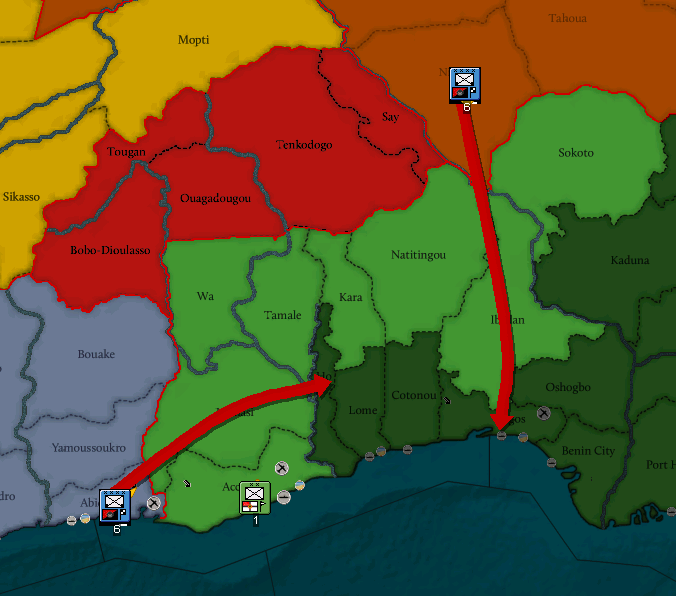 HEMINGWAY: It is our hope that the enemy will begin to appear in this region in force as the operation commences. Then Brown will push south and cut off the region from the rest of the mainland. A Mittelafrika isolated from the motherland will be hard pressed to deal with any major setbacks. Many of their units are comprised of Africans, and their morale should be poor. Haywood will be held in reserve. BONNET: Surely Africa should be a secondary priority? We could certainly use more troops on our line. GITLOW: Out of the question. I didn't get our men killed and put my rear end on the fire with the Chamber just to abandon the region to Germany. OLSON: The African Section will never forgive us if we abandon them before they're ready to defend themselves. I agree, it is out of the question. THOMAS: And from a humanitarian standpoint, Africa requires liberation more than any other region in the world. What Goering has put together there... It has to stop.  HEMINGWAY: Our hope is that the Abraham Lincoln Corps will not be needed there and we can redeploy them elsewhere. BONNET: To France? HEMINGWAY: We were thinking Italy, actually, for a few reasons. 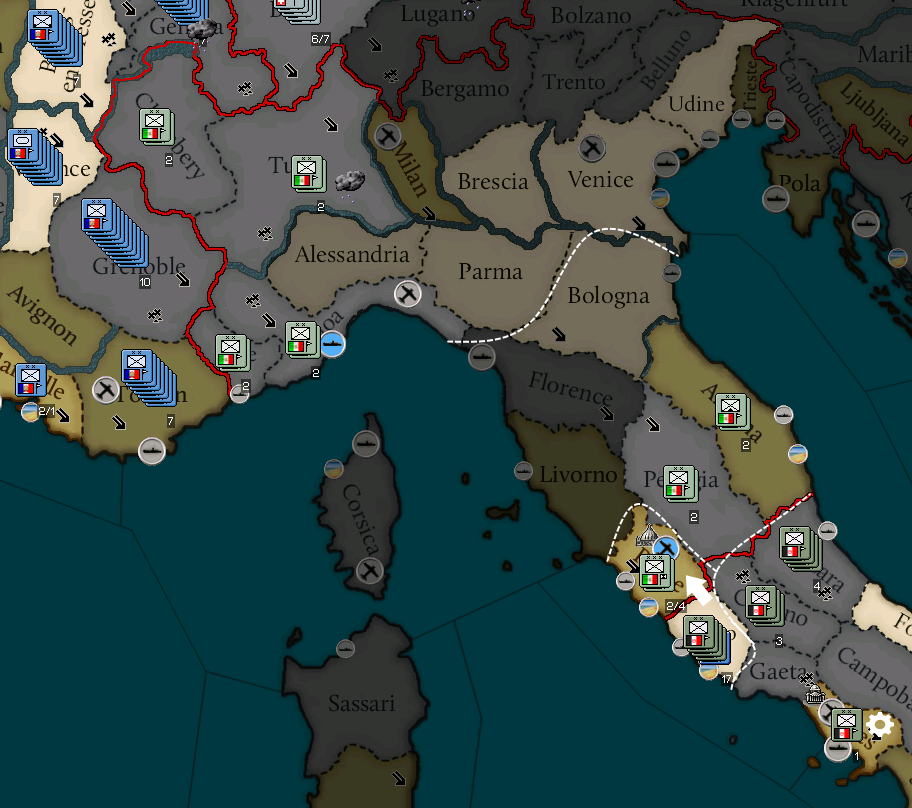 HEMINGWAY: They are more outnumbered on that specific front, and if the papists can capture the entire peninsula, then they will have free reign to attack France from the south.  TRESCA: It would also be important to have some early successes, in order to reassure the Internationale that we are capable of winning this. The seizure of Anzio has put us within striking distance of Rome. HEMINGWAY: We have been recruiting Americans who can speak Italian to join Rose in Anzio. We've acquired assurances from Naples that they will put their forces under Rose's command. No offense, Ambassador, but I don't think we could come up with a similar arrangement in France. GITLOW: And I won't have American troops under French command. BONNET: I understand. HEMINGWAY produces a long stick and uses it to draw attention to a certain area of the map. HEMINGWAY: Now, this part is the crux of War Plan Black. He rests the stick on the Suez Canal. HEMINGWAY: As Comrade Olson pointed out, we need to be concerned about a Sydney-Berlin alliance. If we control the Suez Canal, we will be able to isolate the Entente from Mitteleuropa, and isolate Germany from its overseas colonies. MATTICK: How on earth are we going to get there? We don't have the ships to force a landing in Egypt. HEMINGWAY: We'll drive. From Tunisia. 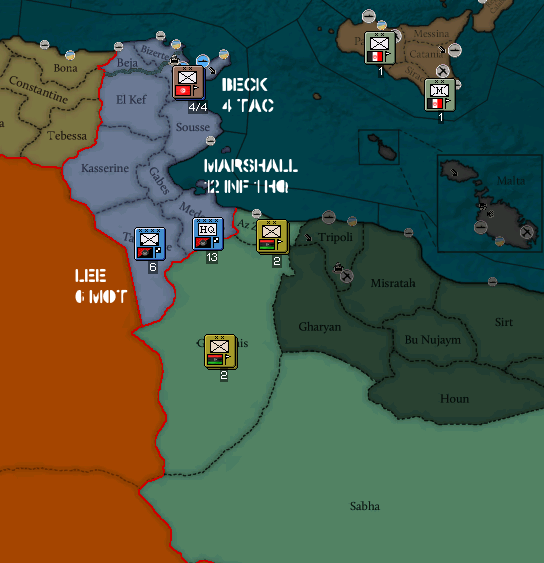 OLSON: Through the Arab bloc? I think they might take issue with that. GITLOW: The plan does necessitate an attack on the Arab bloc. We were hoping they would take the opportunity presented by our attack to make their own attack on the Ottomans, thus denying the canal to the Germans just the same. Our latest assessment is that this is unfortunately not very likely. THOMAS: The Egyptian army is not small, are we committing enough troops on this front? HEMINGWAY: We have a motorized corps in place. We should be able to move rapidly towards the canal and quickly subdue Libyan resistance by flanking them from the south. 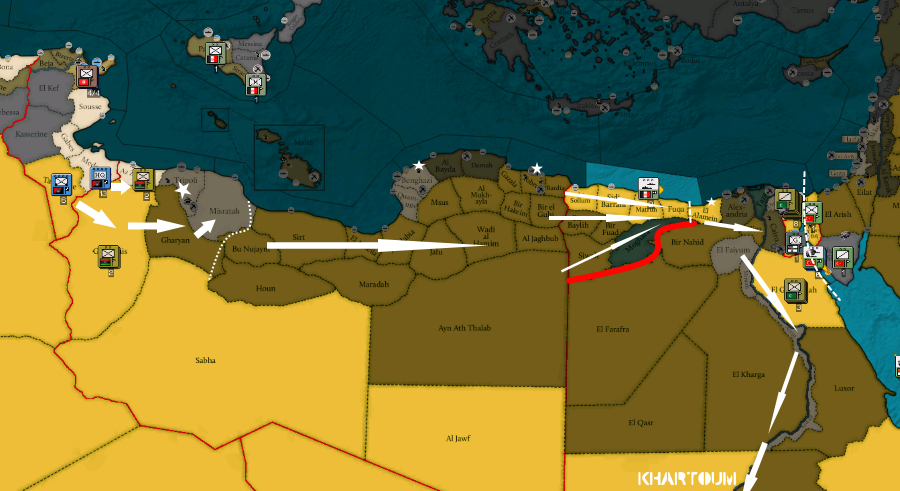 BONNET: Until you get to Egypt. You will have a hell of a time trying to flank anybody through the Qattara Depression. HEMINGWAY: Yes, that is an area of concern, but we should be able to use our air power to break through at that point. BONNET: And what if the Ottomans help them? OLSON: Not likely. First of all, the Ottomans have barely been able to hold their empire together and second of all, the Egyptians loathe the Ottomans. The only way the Ottomans are getting in is if they invade themselves, which would probably turn into a nightmare for them. BONNET: I still question the wisdom of drawing more enemies into the conflict. 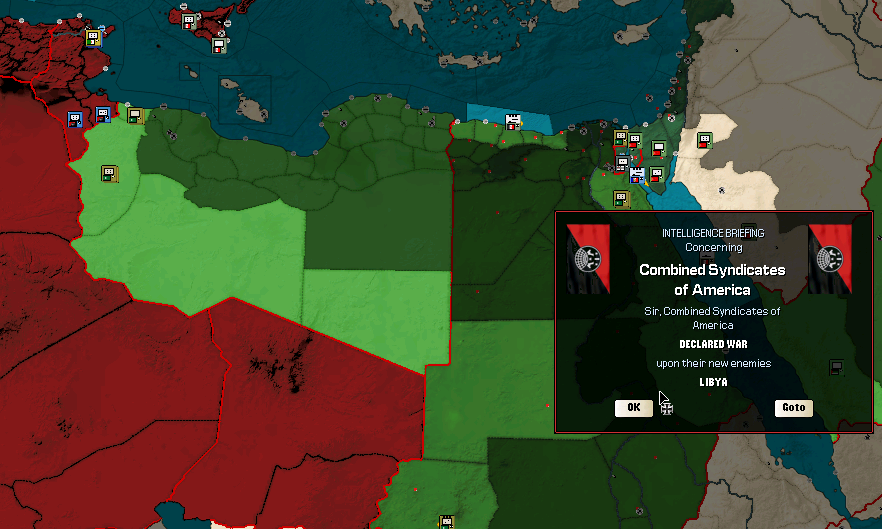 GITLOW: We are making the enemies and I assure you, Ambassador, America will handle them. 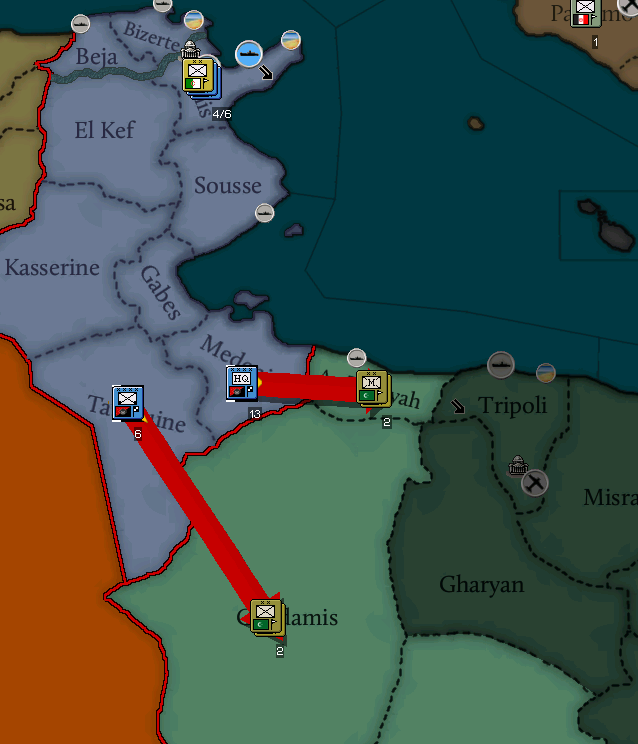 BONNET: I hope so. HEMINGWAY: That accounts for one entrance into the Mediterranean. In order to have free reign to assist the Italians and engage the Prague Pact through their southern underbelly, we are going to need total control of the Mediterranean. HEMINGWAY drags his pointer across the Mediterranean and brings it to rest in Gibraltar. 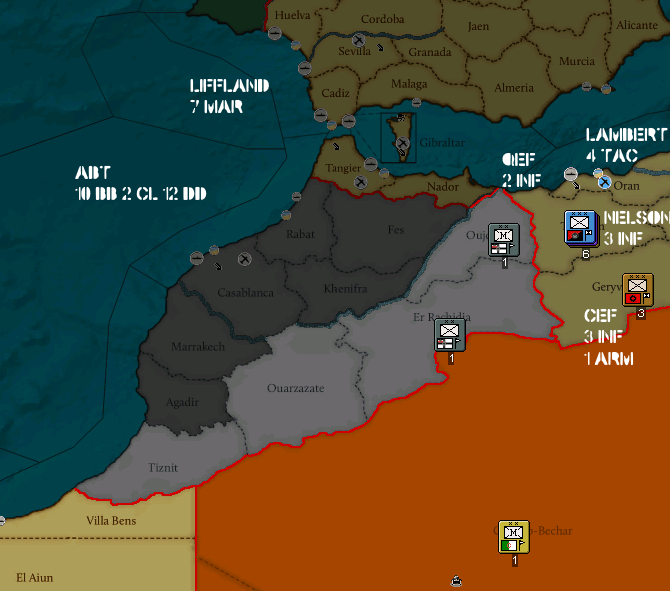 HEMINGWAY: We need the Straits. 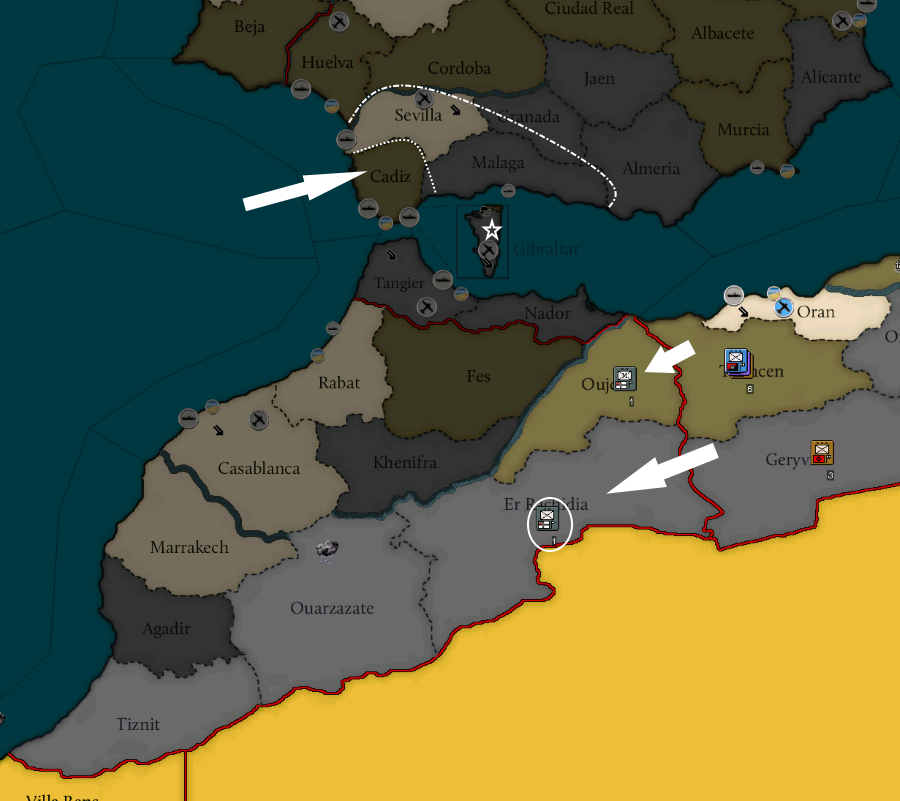 BONNET: Spain controls both sides? Are you suggesting that- 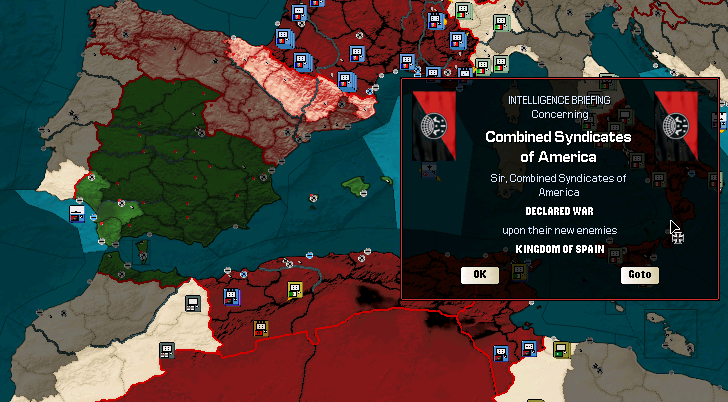 GITLOW: Also part of the plan. The Revolutionary Marines are going to land on the Atlantic Coast of Spain and seize Gibraltar. 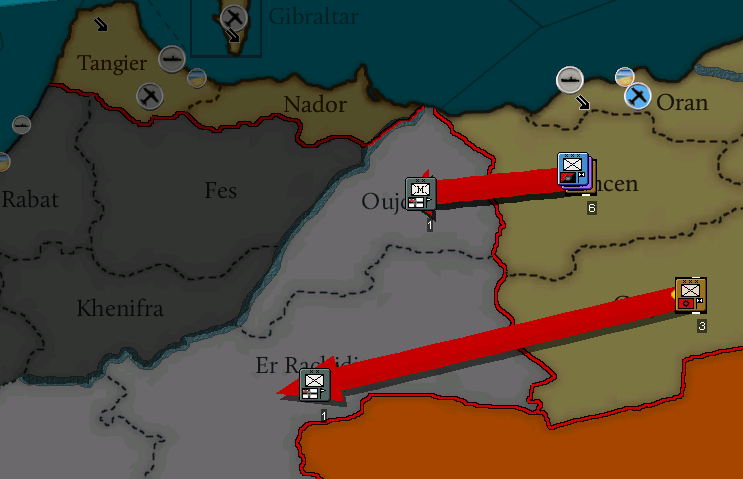 HEMINGWAY: While our first OAS force seizes Morocco to the south. It seems as good a place as any to test out a trinational military force. 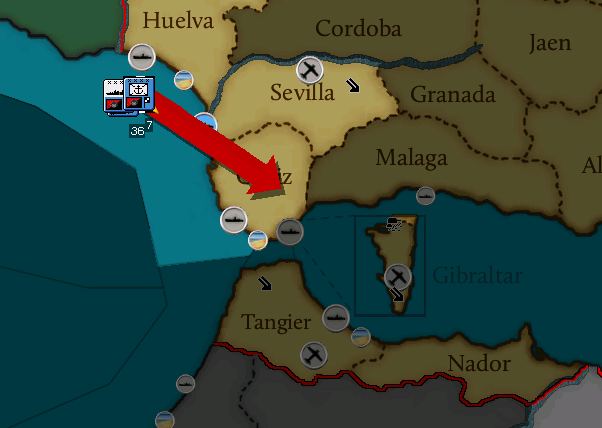 MATTICK: A landing? Very risky and once again, we don't have the ships. OLSON: It won't be an opposed landing. The loyalists have everybody who can hold a gun engaged against the Carlists in the north. The only Spaniards there to greet us will be old women and children. 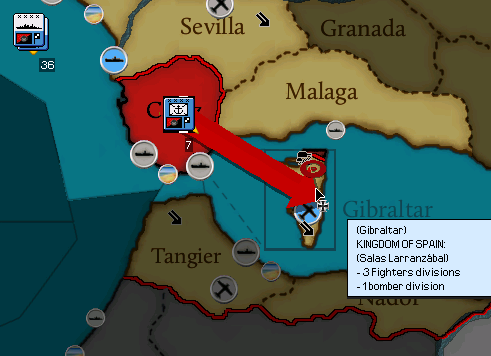 MATTICK: Attacking two different neutral powers? TRESCA: Spain is not neutral in the context of the struggle. They stamped out the CNT-FAI. Bring in whatever exiled Spanish comrades we can find, make sure to take pictures of their return. The Chamber still has a bug up their rear end that France didn't do enough to help the CNT-FAI. It'll make them happy as clams. BONNET: What of the Carlists? GITLOW: Who cares? BONNET: I would worry about alienating the British. This whole plan is very... audacious. A British commitment would be worthwhile and they may object to parts of this plan. 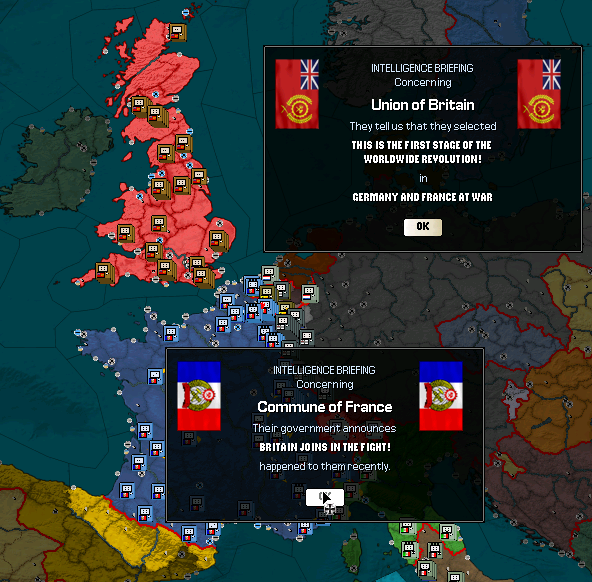 GITLOW: We'll notify them of what we're planning, but we certainly will not compromise on any aspect of it. Britain has the North Sea to contend with, France the fields of Flanders, and we will make the Mediterranean a socialist lake. We will not tell either you nor the British how to fight their wars, and we expect not to be told how to fight ours. BONNET: Still, to risk losing their support... It could be catastrophic. GITLOW: They'll join us or they'll die on their own. The room is silent. GITLOW: Tell Marshall that War Plan Black is a go. HEMINGWAY: Yes, Comrade. HEMINGWAY exits the room. The room remains silent. GITLOW: The rest of you... The room stares solemnly at GITLOW, awaiting his command. GITLOW: Go home. Tomorrow will be the last normal day for a very long time. Enjoy it. The rest of the room files out, one by one. GITLOW remains, alone. He looks up from the table at a portrait of his departed friend Jack Reed. GITLOW: Is this what you would have done? GITLOW sits for a moment, nods, then stands and exits the room.
|
|
|























